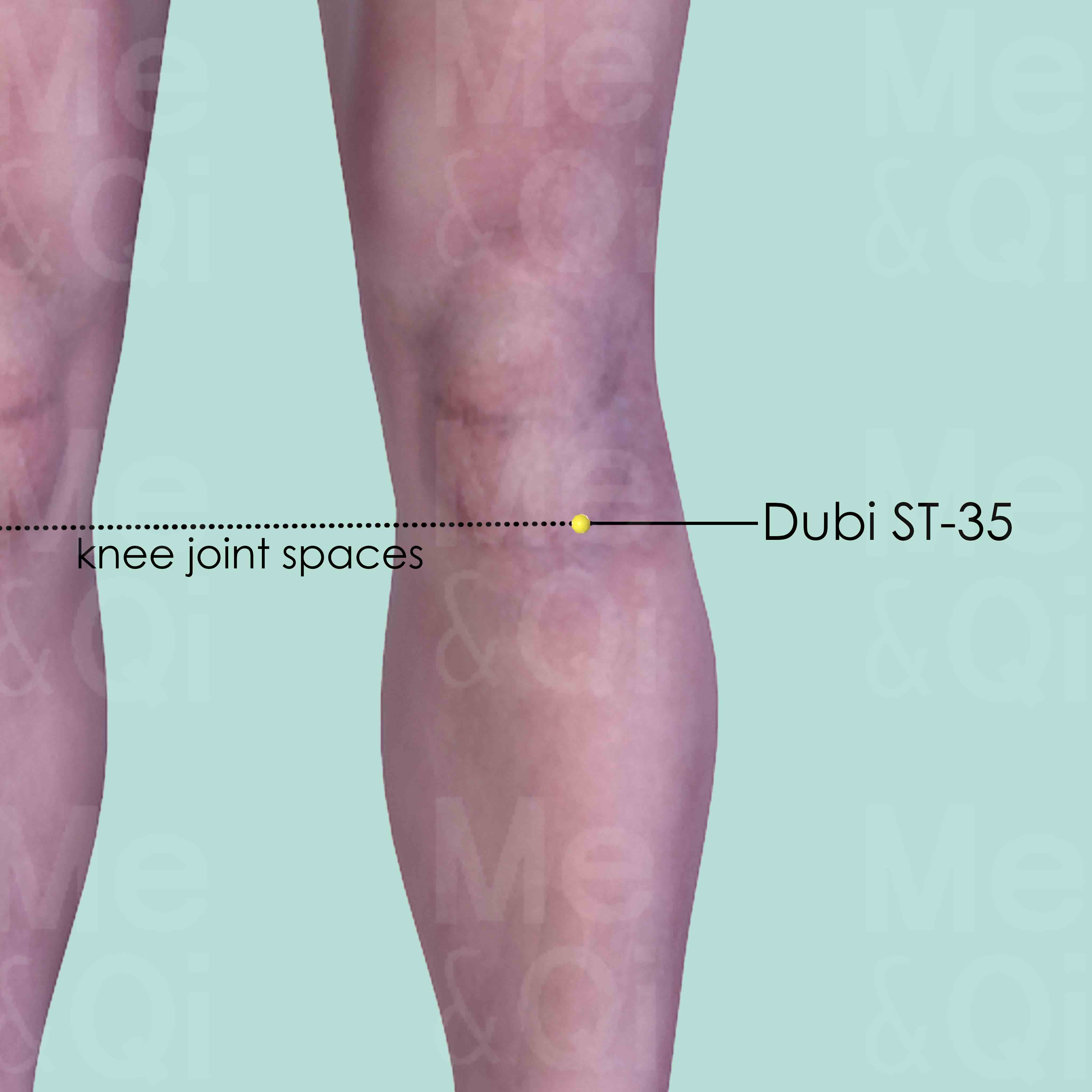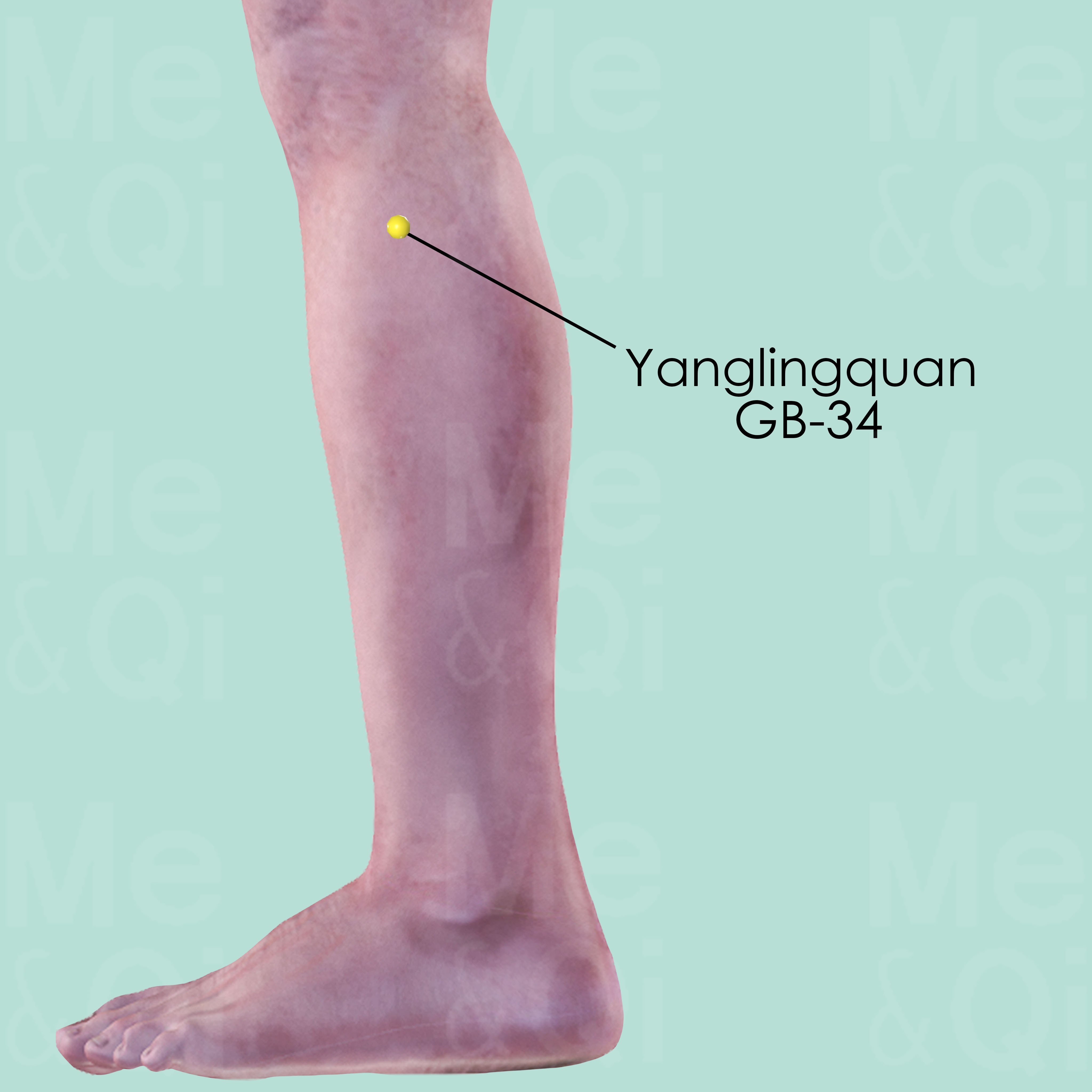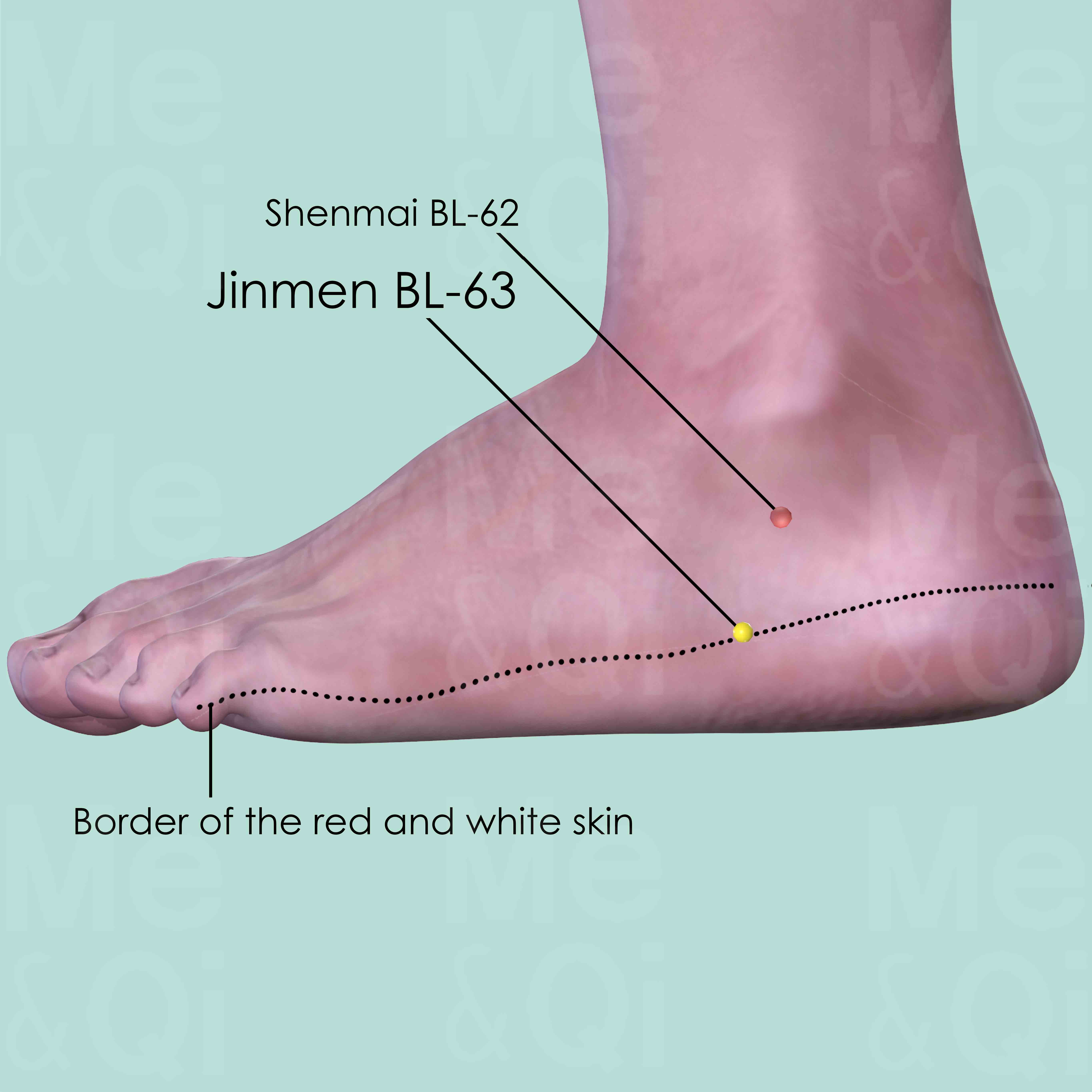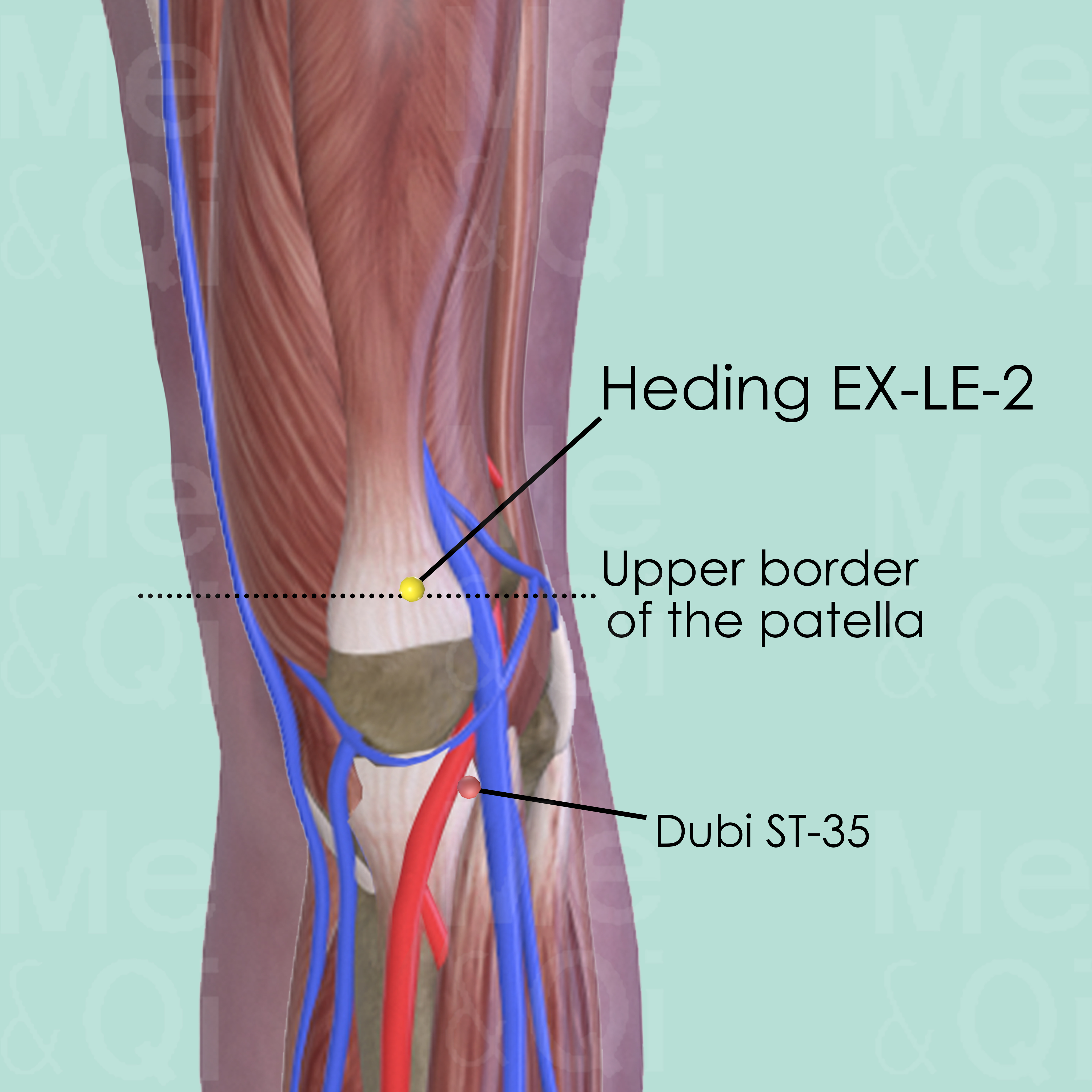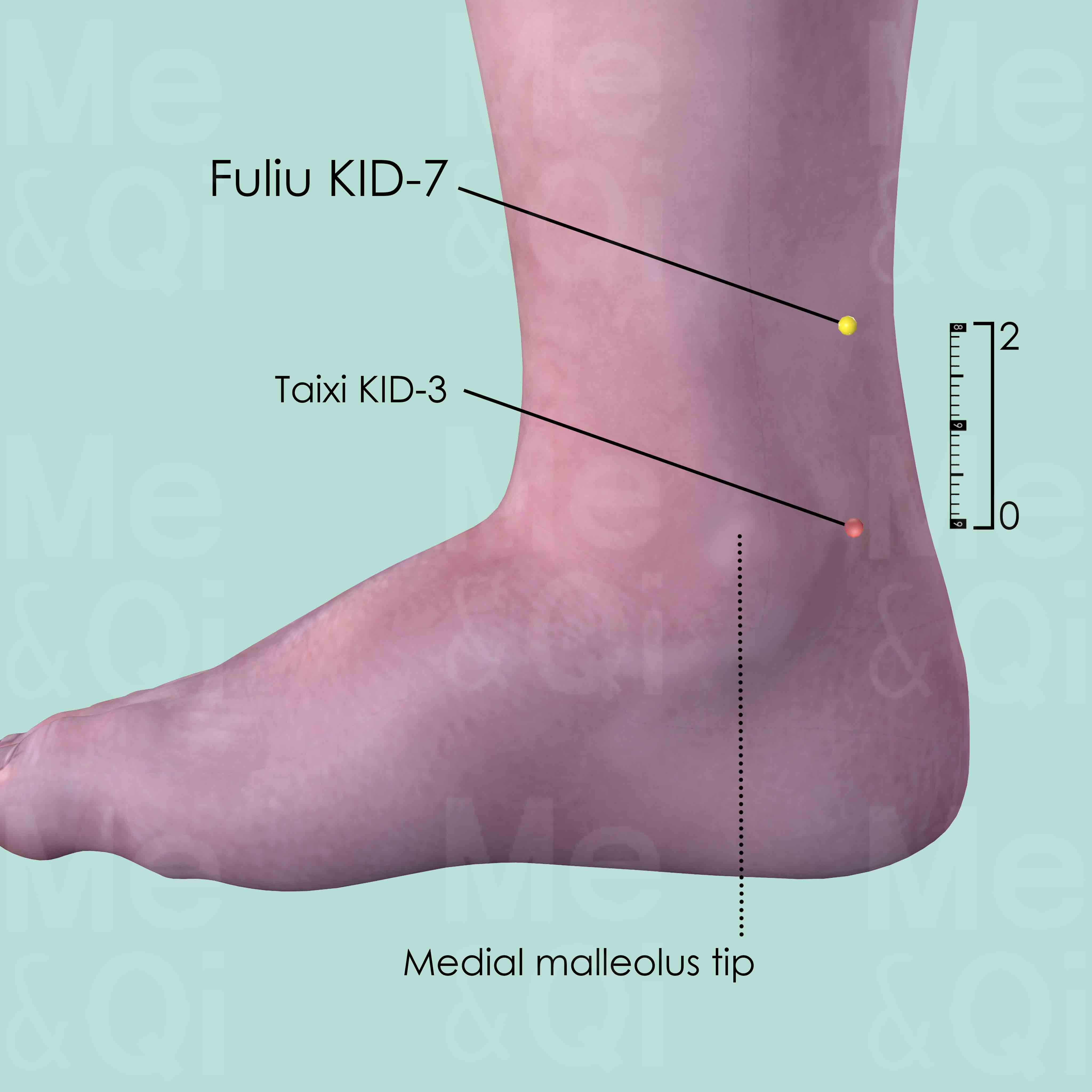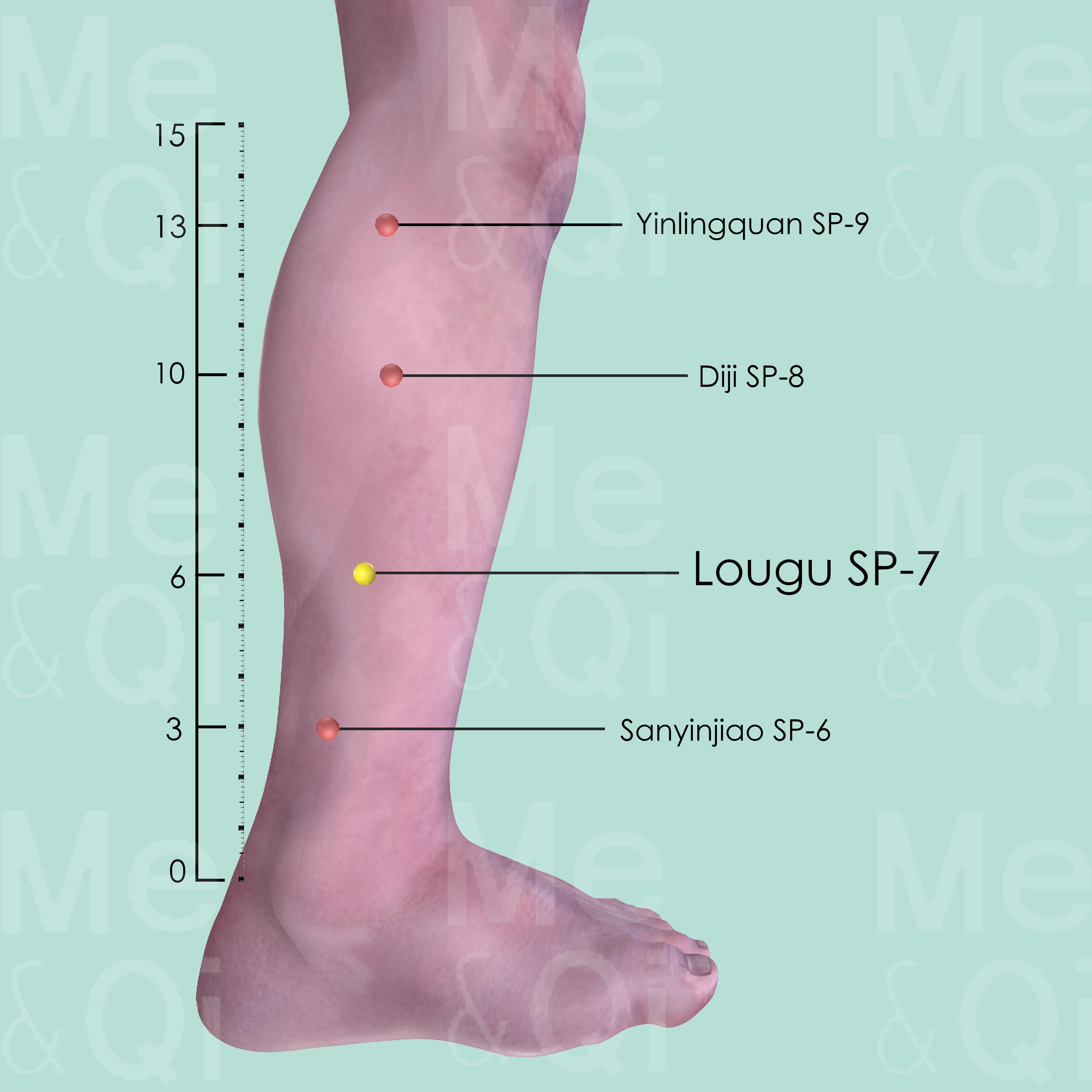Knee Painaccording to TCM
Symptom families: Joint Pain and Discomfort, Joint Symptoms, Knee Conditions
Did you mean? Sore Knees
What is Knee Pain?
Knee pain is a universal symptom that transcends age and activity level. It can stem from acute injuries like a torn ligament or meniscal damage, or chronic conditions such as arthritis. Symptoms often include stiffness, swelling, and difficulty in bearing weight, making it a leading cause of distress and functional limitation.
How Does TCM View Knee Pain?
Traditional Chinese Medicine (TCM) sees knee pain not just as a localized discomfort but as a sign of an underlying imbalance in the body's energy, or Qi. TCM often links knee health to the Kidney Channel, asserting that weakness or stagnation here can manifest as knee pain. The holistic approach of TCM seeks to restore harmony through the body, addressing the root of the pain rather than just its symptoms.
Root Causes of Knee Pain in TCM
In TCM, knee pain is often attributed to a Deficiency in Kidney Yang or the presence of Cold and Dampness invading the lower body. A Kidney Yang Deficiency may present with symptoms like a dull ache in the knees, a feeling of cold, and weakness in the legs, suggesting a vital need to warm and invigorate the body's Yang energy.
Conversely, Dampness tends to manifest in heaviness and edema, with pain that lingers like a persistent fog. Addressing these imbalances through tailored treatments is essential for lasting relief.
Explore below more details about what might cause Knee pain according to TCM.
- By Syndrome
- By Organ
- Yang Deficiency
- Yin Deficiency
- Blood Deficiency
- Essence Deficiency
- Qi Deficiency
- Heat
- View More Causes
- Kidney
- Liver
- Spleen
- Heart
- View More Organs
Yang Deficiency
Yang deficiency in TCM refers to a state where the body's Yang energy, which is responsible for warmth, activity, and function, is weakened or diminished. This pattern of disharmony often arises from chronic illness, aging, or inherent constitutional weakness. Symptoms of Yang deficiency are typically associated with cold and sluggishness, such as a feeling of coldness, cold extremities, pale complexion, low energy or fatigue, and a desire for warmth. Digestive issues like poor appetite, loose stools, and water retention can also be indicative of Yang deficiency.... see more
Yang Deficiency Patterns That Can Lead to Knee Pain
Common Symptoms: Dizziness Tinnitus Chills Generalized Fatigue Diarrhea Depression Frequent Urination Coughing
| Pattern Name | Relevant Symptoms | Relevant Formulas |
|---|---|---|
| Kidney Yang Deficiency | Knee pain, Weakness and aching in the knees, Lower back pain, Dizziness, Tinnitus, Weak and cold knees, Lower back coldness, Chills, Weak legs, Bright pale face, Generalized fatigue, General weakness, Leg edema, Female infertility, Diarrhea, Depression, Erectile dysfunction, Premature ejaculation, Oligospermia, Low sex drive, Pale and abudant urination, Constipation... see more | Wu Zi Yan Zong Wan | You Gui Wan |
| Spleen or Kidney Yang Deficiency | Knee pain, Abdominal pain that worsens with cold, Urinary dysfunction, Deep pain and heaviness in limbs, Dizziness, Heavy sensation in the head, Edema, Diarrhea, Palpitations, Coughing, Vomit... see more | Gu Ben Zhi Beng Tang |
Yin Deficiency
Yin deficiency in TCM is a pattern of disharmony characterized by a depletion of the body's Yin energy, which represents the cooling, moistening, and nurturing aspects of our physiology. This condition often arises from factors like chronic stress, overwork, insufficient rest, or prolonged illness. Symptoms of Yin deficiency can include a sensation of heat, especially in the afternoon or evening, night sweats, insomnia, a dry mouth or throat, and a red tongue with little coating. There might also be a general feeling of restlessness or irritability. Since Yin is essential for balancing the body's active and warm Yang energy, its deficiency leads to a relative excess of Yang, manifesting as heat or dryness symptoms.... see more
Yin Deficiency Patterns That Can Lead to Knee Pain
Common Symptoms: Dizziness Tinnitus Flushed Cheekbones Night Sweats Restlessness Scanty Menstruation Pale Menstrual Flow Back Pain
| Pattern Name | Relevant Symptoms | Relevant Formulas |
|---|---|---|
| Kidney-Deficiency | Knee pain, Scanty menstruation, Pale menstrual flow, Back pain, Dizziness, Tinnitus, Frequent urination, Late menstruation, Chills, Cold extremities, Pale face... see more | Dang Gui Di Huang Yin | He Che Da Zao Wan | Shi Quan Da Bu Tang |
| Disharmony between Heart and Kidneys | Weakness and aching in the knees, Dizziness, Tinnitus, Insomnia, Palpitations, Poor memory, Lower back pain, Knee pain, Night sweats, Constipation, Menopausal hot flashes... see more | Liu Wei Di Huang Wan | Tian Wang Bu Xin Dan |
Blood Deficiency
Blood Deficiency in TCM is like when your body's tank runs low on the vital energy that blood provides. It's not exactly the same as anemia in modern medicine, which is about having too few red blood cells. Instead, Blood Deficiency in TCM is about your body not having enough of the life-giving qualities that blood brings, like nourishment and moisture. This can make you feel tired, look pale, and even feel dizzy or have blurry vision. It's like a garden not getting enough water to stay lush and vibrant. TCM sees this as an imbalance where the body isn't being nourished as it should be, impacting overall health and well-being.... see more
Blood Deficiency Patterns That Can Lead to Knee Pain
| Pattern Name | Relevant Symptoms | Relevant Formulas |
|---|---|---|
| Liver Blood and Kidney Essence Deficiency | Knee pain, Primary amenorrhea, Lower back pain, Generalized fatigue, Dizziness, Depression, Amenorrhea, Low energy, Chills, Dark face, Dry mouth... see more | Dang Gui Di Huang Yin | Liu Wei Di Huang Wan | He Che Da Zao Wan |
Essence Deficiency
In TCM "Essence" (Jing) deficiency refers to a depletion of the body's fundamental substance, which is vital for growth, development, reproduction, and overall vitality. Jing, often translated as "Essence," is a unique concept in TCM, seen as the basis of all life activities and inherited from our parents. Essence deficiency manifests in various symptoms, such as chronic fatigue, weakness, slow physical or mental development, fertility issues, premature aging, weak bones, and a lackluster complexion. It can also affect the hair, leading to premature greying or hair loss. This pattern of disharmony often arises from congenital factors, chronic illness, overwork, or excessive behaviors that drain the body's resources. ... see more
Essence Deficiency Patterns That Can Lead to Knee Pain
| Pattern Name | Relevant Symptoms | Relevant Formulas |
|---|---|---|
| Liver Blood and Kidney Essence Deficiency | Knee pain, Primary amenorrhea, Lower back pain, Generalized fatigue, Dizziness, Depression, Amenorrhea, Low energy, Chills, Dark face, Dry mouth... see more | Dang Gui Di Huang Yin | Liu Wei Di Huang Wan | He Che Da Zao Wan |
Qi Deficiency
Qi Deficiency in TCM is like running low on battery power. Qi is the vital energy that powers every function in your body. When there's a Qi Deficiency, it means your body doesn't have enough of this essential energy. This can make you feel tired all the time, weak, or even cause shortness of breath. It's similar to how you feel when you haven't had enough sleep or nutritious food. Your body just doesn't have the energy it needs to perform at its best. Unlike modern medicine, which often focuses on specific physical causes for fatigue and weakness, TCM views Qi Deficiency as an overall energy depletion that affects your entire well-being, and it seeks to replenish and balance this vital energy.... see more
Qi Deficiency Patterns That Can Lead to Knee Pain
| Pattern Name | Relevant Symptoms | Relevant Formulas |
|---|---|---|
| Kidney Qi not Firm | Weakness and aching in the knees, Lower back pain, Lower back weakness, Polyuria, Weak urine stream, Enuresis, Nocturnal emission, Generalized fatigue, Chills, Cold extremities, White vaginal discharge, Bearing down sensation in abdomen, Recurrent miscarriage... see more | You Gui Wan | Jin Suo Gu Jing Wan | Fu Tu Dan | Qing E Wan | Tu Si Zi Wan |
Heat
In TCM "Heat" signifies an excess of Yang energy, leading to an imbalance where heat predominates over the body's cool Yin aspects. This condition is metaphorically akin to an internal over-heating. Symptoms indicative of Heat can include feelings of warmth, fever, sweating, irritability, red face, thirst with a preference for cold drinks, and a rapid pulse. The tongue may appear red with a yellow coating. Unlike the common interpretation of heat in terms of temperature, in TCM, it represents a state of hyperactivity or inflammation in the body.... see more
Heat Patterns That Can Lead to Knee Pain
| Pattern Name | Relevant Symptoms | Relevant Formulas |
|---|---|---|
| Disharmony between Heart and Kidneys | Weakness and aching in the knees, Dizziness, Tinnitus, Insomnia, Palpitations, Poor memory, Lower back pain, Knee pain, Night sweats, Constipation, Menopausal hot flashes... see more | Liu Wei Di Huang Wan | Tian Wang Bu Xin Dan |
Kidney
In TCM the Kidneys are regarded as the body's most fundamental reservoir of Essence, known as Jing, which influences growth, reproduction, and aging. They are not just organs for filtering blood, but a holistic system governing vital life forces. When the Kidneys malfunction in TCM, it can manifest as a variety of health issues, such as chronic fatigue, reproductive problems, imbalances in fluid metabolism leading to edema or dryness, lower back pain, and a sense of fear or insecurity.... see more
Kidney Patterns That Can Lead to Knee Pain
Common Symptoms: Dizziness Chills Lower Back Pain Tinnitus Generalized Fatigue Frequent Urination Back Pain Night Sweats
| Pattern Name | Relevant Symptoms | Relevant Formulas |
|---|---|---|
| Kidney Yang Deficiency | Knee pain, Weakness and aching in the knees, Lower back pain, Dizziness, Tinnitus, Weak and cold knees, Lower back coldness, Chills, Weak legs, Bright pale face, Generalized fatigue, General weakness, Leg edema, Female infertility, Diarrhea, Depression, Erectile dysfunction, Premature ejaculation, Oligospermia, Low sex drive, Pale and abudant urination, Constipation... see more | Wu Zi Yan Zong Wan | You Gui Wan |
| Kidney Qi not Firm | Weakness and aching in the knees, Lower back pain, Lower back weakness, Polyuria, Weak urine stream, Enuresis, Nocturnal emission, Generalized fatigue, Chills, Cold extremities, White vaginal discharge, Bearing down sensation in abdomen, Recurrent miscarriage... see more | You Gui Wan | Jin Suo Gu Jing Wan | Fu Tu Dan | Qing E Wan | Tu Si Zi Wan |
| Liver Blood and Kidney Essence Deficiency | Knee pain, Primary amenorrhea, Lower back pain, Generalized fatigue, Dizziness, Depression, Amenorrhea, Low energy, Chills, Dark face, Dry mouth... see more | Dang Gui Di Huang Yin | Liu Wei Di Huang Wan | He Che Da Zao Wan |
| Spleen or Kidney Yang Deficiency | Knee pain, Abdominal pain that worsens with cold, Urinary dysfunction, Deep pain and heaviness in limbs, Dizziness, Heavy sensation in the head, Edema, Diarrhea, Palpitations, Coughing, Vomit... see more | Gu Ben Zhi Beng Tang |
| Kidney-Deficiency | Knee pain, Scanty menstruation, Pale menstrual flow, Back pain, Dizziness, Tinnitus, Frequent urination, Late menstruation, Chills, Cold extremities, Pale face... see more | Dang Gui Di Huang Yin | He Che Da Zao Wan | Shi Quan Da Bu Tang |
| Disharmony between Heart and Kidneys | Weakness and aching in the knees, Dizziness, Tinnitus, Insomnia, Palpitations, Poor memory, Lower back pain, Knee pain, Night sweats, Constipation, Menopausal hot flashes... see more | Liu Wei Di Huang Wan | Tian Wang Bu Xin Dan |
Liver
In TCM the Liver is viewed as the organ responsible for the smooth flow of Qi, Blood, and emotions throughout the body. It plays a key role in regulating mood, storing blood, supporting digestion, and ensuring the health of tendons and eyes. When the Liver malfunctions or is imbalanced in TCM, it can lead to a range of issues such as irritability, mood swings, menstrual irregularities, eye problems, and muscular stiffness or pain. A malfunctioning Liver in TCM reflects not only physical disturbances but also emotional and mental disharmony, emphasizing the holistic approach of TCM in addressing health and wellness.... see more
Liver Patterns That Can Lead to Knee Pain
| Pattern Name | Relevant Symptoms | Relevant Formulas |
|---|---|---|
| Liver Blood and Kidney Essence Deficiency | Knee pain, Primary amenorrhea, Lower back pain, Generalized fatigue, Dizziness, Depression, Amenorrhea, Low energy, Chills, Dark face, Dry mouth... see more | Dang Gui Di Huang Yin | Liu Wei Di Huang Wan | He Che Da Zao Wan |
Spleen
In TCM the Spleen plays a vital role in digestion and transformation, converting food into energy and nutrients, and overseeing the distribution of Qi and Blood. It's also crucial in maintaining the health of muscles and limbs and ensuring the blood remains within the vessels. When the Spleen malfunctions in TCM, it can lead to a variety of issues such as digestive disorders, fatigue, weak muscles, bloating, and a feeling of heaviness. It can also cause a pale complexion, poor appetite, and a tendency to bruise easily. Emotionally, a Spleen imbalance is often associated with excessive worry or overthinking, reflecting its role in the interplay between physical and mental health.... see more
Spleen Patterns That Can Lead to Knee Pain
| Pattern Name | Relevant Symptoms | Relevant Formulas |
|---|---|---|
| Spleen or Kidney Yang Deficiency | Knee pain, Abdominal pain that worsens with cold, Urinary dysfunction, Deep pain and heaviness in limbs, Dizziness, Heavy sensation in the head, Edema, Diarrhea, Palpitations, Coughing, Vomit... see more | Gu Ben Zhi Beng Tang |
Heart
In TCM the Heart is considered the "emperor" of all organs, primarily responsible for governing Blood and housing the mind, known as "Shen." It plays a crucial role in maintaining mental-emotional equilibrium and controlling the circulation of Qi and blood throughout the body. When the Heart is imbalanced or malfunctions in TCM, it can lead to a range of issues like heart palpitations, insomnia, dream-disturbed sleep, anxiety, and a flushed complexion. Emotional disturbances such as excessive joy or lack of joy are also seen as signs of Heart disharmony. These symptoms reflect not just physical heart conditions but also the state of one's Shen, indicating the interconnectedness of physical and emotional well-being in TCM.... see more
Heart Patterns That Can Lead to Knee Pain
| Pattern Name | Relevant Symptoms | Relevant Formulas |
|---|---|---|
| Disharmony between Heart and Kidneys | Weakness and aching in the knees, Dizziness, Tinnitus, Insomnia, Palpitations, Poor memory, Lower back pain, Knee pain, Night sweats, Constipation, Menopausal hot flashes... see more | Liu Wei Di Huang Wan | Tian Wang Bu Xin Dan |
TCM Herbal Formulas for Knee Pain
The TCM pharmacopeia offers a range of formulas and herbs specifically selected to counteract the patterns causing knee pain. For Kidney Yang Deficiency, a practitioner might recommend warming herbs such as Cuscuta Seeds, found in Wu Zi Yan Zong Wan, known for its Yang-boosting properties.
For Blood Deficiency related pattern causing dull pain and weakness, a formula like Dang Gui Di Huang Yin, rich in Dong quai, can nourish and invigorate the Blood, promoting healing and strength.
Explore below some TCM herbal formulas used to address knee pain, organized by cause and by formula type.
- By Cause
- By Formula Type
- Yang Deficiency
- Yin Deficiency
- Blood Deficiency
- Essence Deficiency
- Qi Deficiency
- Heat
- View More Causes
- Formulas that warm yang and tonify
- Formulas that tonify yin and yang
- Formulas that secure essence and stop enuresis
- Formulas that tonify blood
- Formulas that nourish yin and tonify
- Formulas that tonify qi and blood
- Formulas that warm the meridians and disperse cold
- Formulas that dispel wind-Damp
- Formulas that dredge and disperse external wind
- Formulas that nourish the heart and calm the mind
Top Formula for Yang Deficiency:
You Gui Wan
Suitable for Yang Deficiency patterns that may cause knee pain, such as Kidney Yang Deficiency
Learn moreAll Formulas Recommended for Knee Pain Caused by Yang Deficiency
| Formula | Patterns Suitable For |
|---|---|
| You Gui Wan | Kidney Yang Deficiency |
| Wu Zi Yan Zong Wan | Kidney Yang Deficiency |
| Gu Ben Zhi Beng Tang | Spleen or Kidney Yang Deficiency |
Top Formula for Yin Deficiency:
Dang Gui Di Huang Yin
Suitable for Yin Deficiency patterns that may cause knee pain, such as Kidney-Deficiency
Learn moreAll Formulas Recommended for Knee Pain Caused by Yin Deficiency
| Formula | Patterns Suitable For |
|---|---|
| Dang Gui Di Huang Yin | Kidney-Deficiency |
| He Che Da Zao Wan | Kidney-Deficiency |
| Liu Wei Di Huang Wan | Disharmony between Heart and Kidneys |
| Shi Quan Da Bu Tang | Kidney-Deficiency |
| Tian Wang Bu Xin Dan | Disharmony between Heart and Kidneys |
Top Formula for Blood Deficiency:
Dang Gui Di Huang Yin
Suitable for Blood Deficiency patterns that may cause knee pain, such as Liver Blood and Kidney Essence Deficiency
Learn moreAll Formulas Recommended for Knee Pain Caused by Blood Deficiency
| Formula | Patterns Suitable For |
|---|---|
| Dang Gui Di Huang Yin | Liver Blood and Kidney Essence Deficiency |
| Liu Wei Di Huang Wan | Liver Blood and Kidney Essence Deficiency |
| He Che Da Zao Wan | Liver Blood and Kidney Essence Deficiency |
Top Formula for Essence Deficiency:
Dang Gui Di Huang Yin
Suitable for Essence Deficiency patterns that may cause knee pain, such as Liver Blood and Kidney Essence Deficiency
Learn moreAll Formulas Recommended for Knee Pain Caused by Essence Deficiency
| Formula | Patterns Suitable For |
|---|---|
| Dang Gui Di Huang Yin | Liver Blood and Kidney Essence Deficiency |
| Liu Wei Di Huang Wan | Liver Blood and Kidney Essence Deficiency |
| He Che Da Zao Wan | Liver Blood and Kidney Essence Deficiency |
Top Formula for Qi Deficiency:
You Gui Wan
Suitable for Qi Deficiency patterns that may cause knee pain, such as Kidney Qi not Firm
Learn moreAll Formulas Recommended for Knee Pain Caused by Qi Deficiency
| Formula | Patterns Suitable For |
|---|---|
| You Gui Wan | Kidney Qi not Firm |
| Jin Suo Gu Jing Wan | Kidney Qi not Firm |
| Fu Tu Dan | Kidney Qi not Firm |
| Qing E Wan | Kidney Qi not Firm |
| Tu Si Zi Wan | Kidney Qi not Firm |
Top Formula for Heat:
Liu Wei Di Huang Wan
Suitable for Heat patterns that may cause knee pain, such as Disharmony between Heart and Kidneys
Learn moreAll Formulas Recommended for Knee Pain Caused by Heat
| Formula | Patterns Suitable For |
|---|---|
| Liu Wei Di Huang Wan | Disharmony between Heart and Kidneys |
| Tian Wang Bu Xin Dan | Disharmony between Heart and Kidneys |
Formulas that warm Yang and tonify
These formulas are suitable for some knee pain-causing patterns like Kidney Yang Deficiency or Kidney Qi not Firm.
One such formula is You Gui Wan, with prepared aconite as a key herb.
Other formulas of this category are listed in the table below.
All "formulas that warm yang and tonify" recommended for knee pain
| Formula | Patterns Suitable For (if applicable) |
|---|---|
| You Gui Wan | Kidney Qi not Firm, Kidney Yang Deficiency |
| Wu Zi Yan Zong Wan | Kidney Yang Deficiency |
| Qing E Wan | Kidney Qi not Firm |
| Tu Si Zi Wan | Kidney Qi not Firm |
Formulas that tonify Yin and Yang
These formulas are suitable for some knee pain-causing patterns like Liver Blood and Kidney Essence Deficiency or Kidney-Deficiency.
One such formula is He Che Da Zao Wan, with human placenta as a key herb.
Other formulas of this category are listed in the table below.
All "formulas that tonify yin and yang" recommended for knee pain
| Formula | Patterns Suitable For (if applicable) |
|---|---|
| He Che Da Zao Wan | Liver Blood and Kidney Essence Deficiency, Kidney-Deficiency |
| Shi Quan Da Bu Tang | Kidney-Deficiency |
Formulas that tonify Blood
These formulas are suitable for some knee pain-causing patterns like Liver Blood and Kidney Essence Deficiency or Kidney-Deficiency.
One such formula is Dang Gui Di Huang Yin, with dong quai as a key herb.
Formulas that nourish Yin and tonify
These formulas are suitable for some knee pain-causing patterns like Liver Blood and Kidney Essence Deficiency or Disharmony between Heart and Kidneys.
One such formula is Liu Wei Di Huang Wan, with prepared rehmannia as a key herb.
Formulas that secure Essence and stop enuresis
These formulas are suitable for some knee pain-causing patterns like Kidney Qi not Firm.
One such formula is Jin Suo Gu Jing Wan, with milkvetch seeds as a key herb.
Other formulas of this category are listed in the table below.
All "formulas that secure essence and stop enuresis" recommended for knee pain
| Formula | Patterns Suitable For (if applicable) |
|---|---|
| Jin Suo Gu Jing Wan | Kidney Qi not Firm |
| Fu Tu Dan | Kidney Qi not Firm |
Formulas that tonify Qi and Blood
These formulas are suitable for some knee pain-causing patterns like Spleen or Kidney Yang Deficiency.
One such formula is Gu Ben Zhi Beng Tang, with milkvetch root as a key herb.
Formulas that warm the Meridians and disperse Cold
These formulas are suitable for some knee pain-causing patterns like Painful Obstruction.
One such formula is Wu Tou Tang, with prepared sichuan aconite as a key herb.
Formulas that dispel Wind-Damp
These formulas are suitable for some knee pain-causing patterns like Painful Obstruction.
One such formula is Da Fang Feng Tang, with saposhnikovia root as a key herb.
Formulas that dredge and disperse External Wind
These formulas are suitable for some knee pain-causing patterns like Painful Obstruction.
One such formula is Xiao Huo Luo Dan, with prepared kusnezoffii aconite as a key herb.
Formulas that nourish the Heart and calm the Mind
These formulas are suitable for some knee pain-causing patterns like Disharmony between Heart and Kidneys.
One such formula is Tian Wang Bu Xin Dan, with unprepared rehmannia as a key herb.
Acupoints for Knee Pain
TCM's intricate map of meridians leads to specific acupoints for treating knee pain. Dubi ST-35, located just below the knee cap, is often stimulated to clear obstructions from the channel. Yanglingquan GB-34, near the fibula's head, serves to harmonize the flow of Qi and alleviate pain. These points, among others, are part of a strategic approach to encourage the body's natural healing processes.
Explore below some acupoints used to address knee pain, organized by meridian.
- By Meridian
- Stomach Channel
- Gall Bladder Channel
- Bladder Channel
- Extra Points: Lower Extremities (EX-LE)
- Kidney Channel
- Spleen Channel
- Lung Channel
- Liver Channel
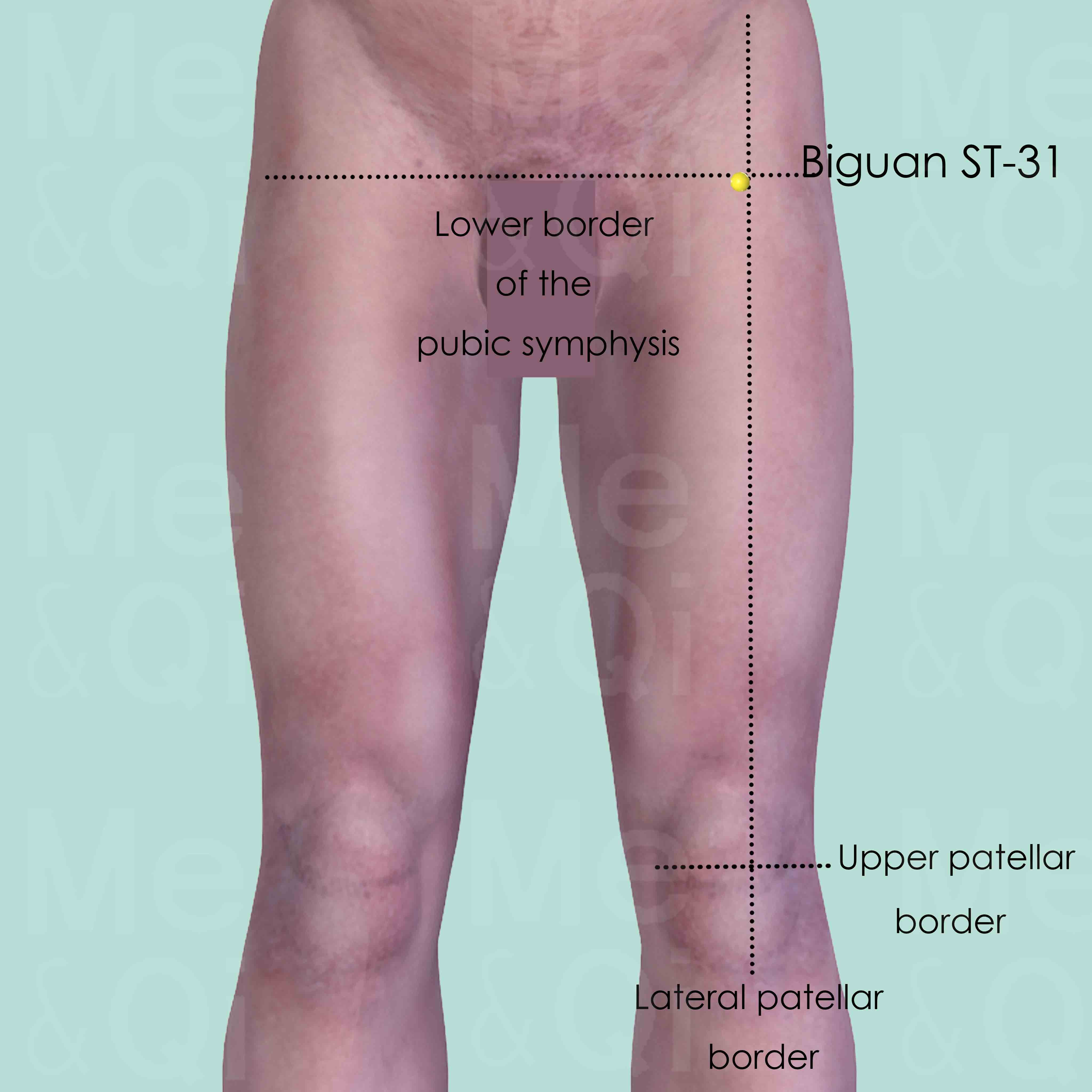
Biguan ST-31
Directly below the anterior superior iliac spine (ASIS), at the level of the lower border of the pubic symphysis, in the depression on the lateral side of sartorius muscle when the thigh is flex.
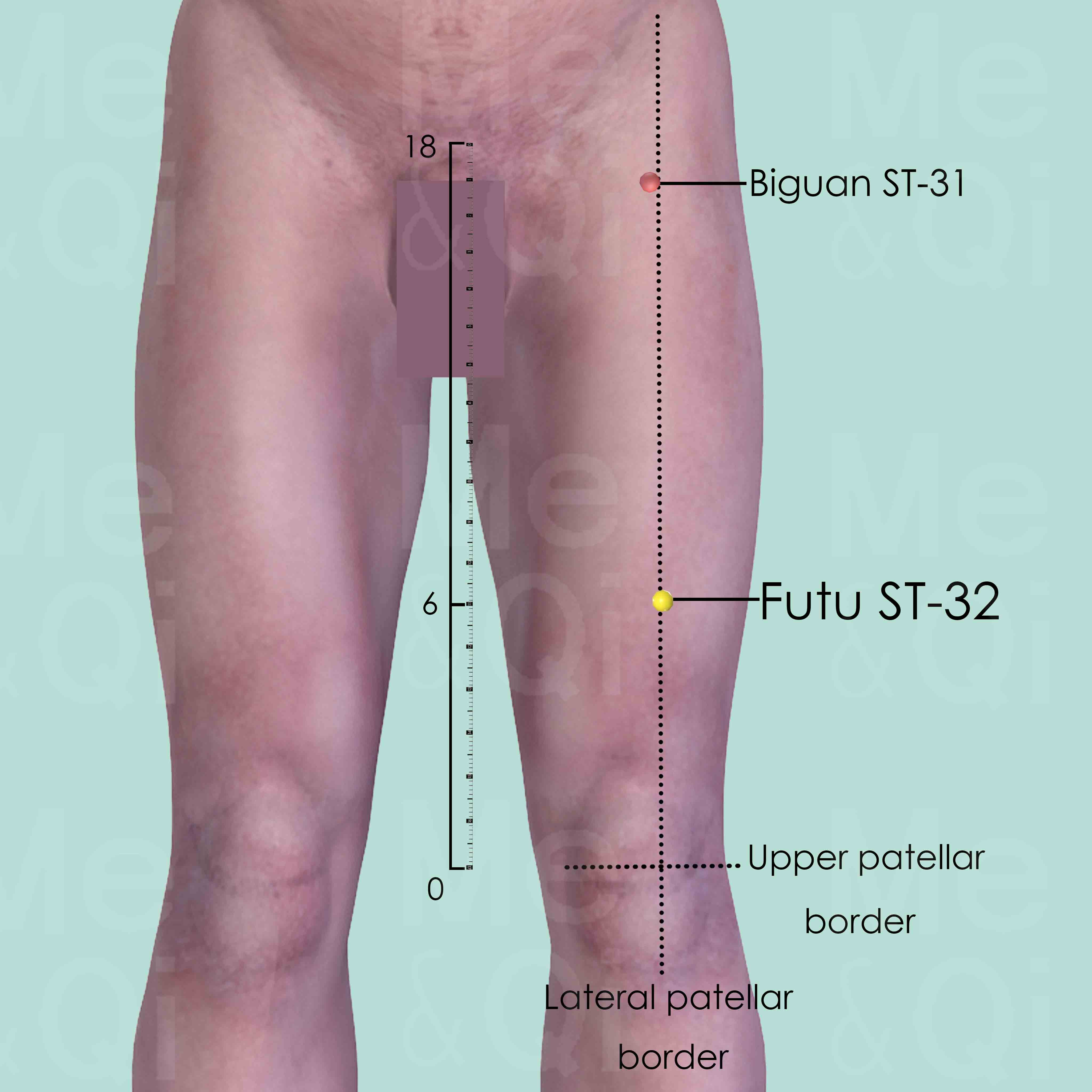
Futu ST-32
6 cun superior to the upper-lateral border of the patella, on the line connecting the anterior superior iliac spine (ASIS) and upper lateral border of the patella.
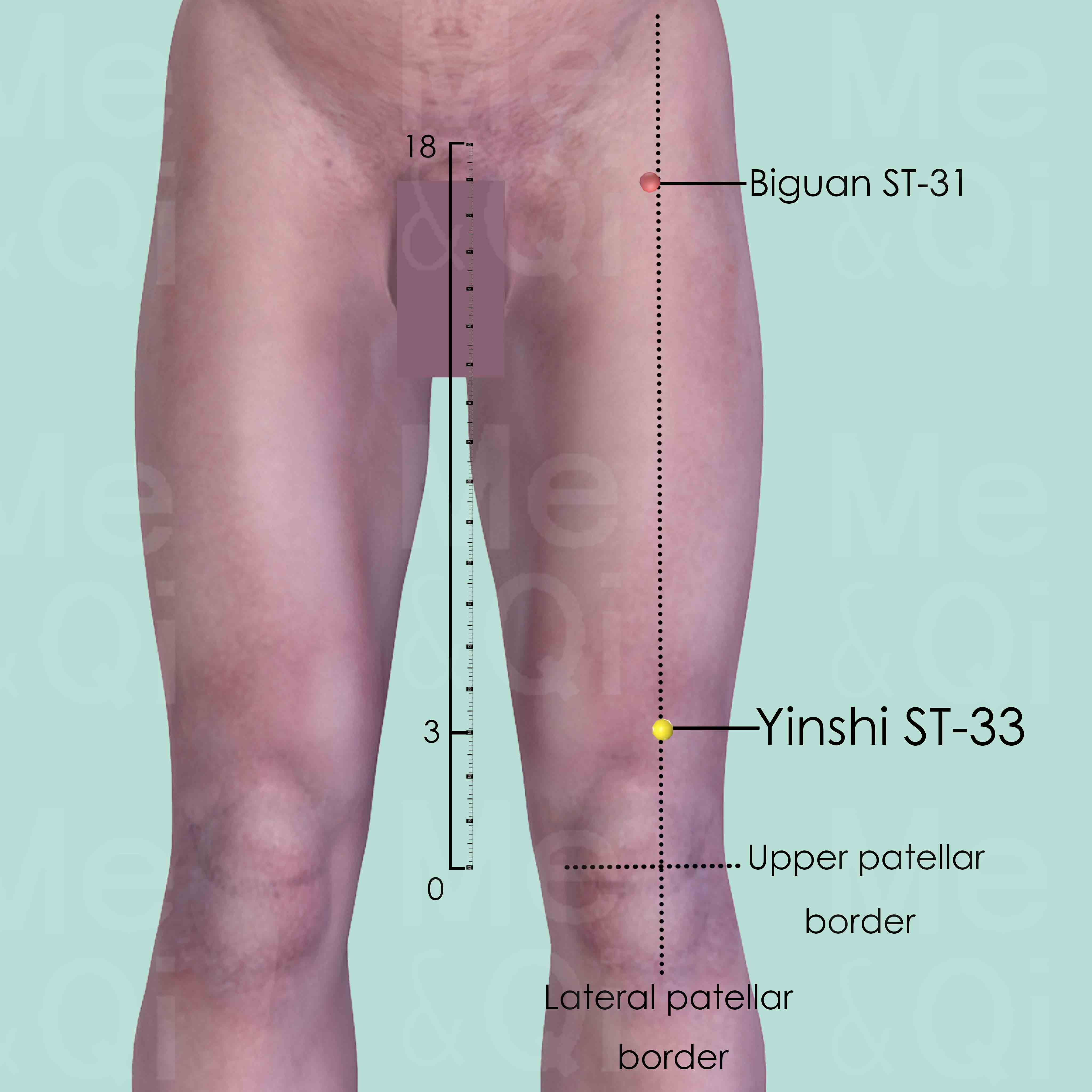
Yinshi ST-33
3 cun above the upper-lateral border of the patella, on a line between the lateral patellar border and the anterior superior iliac spine (ASIS).
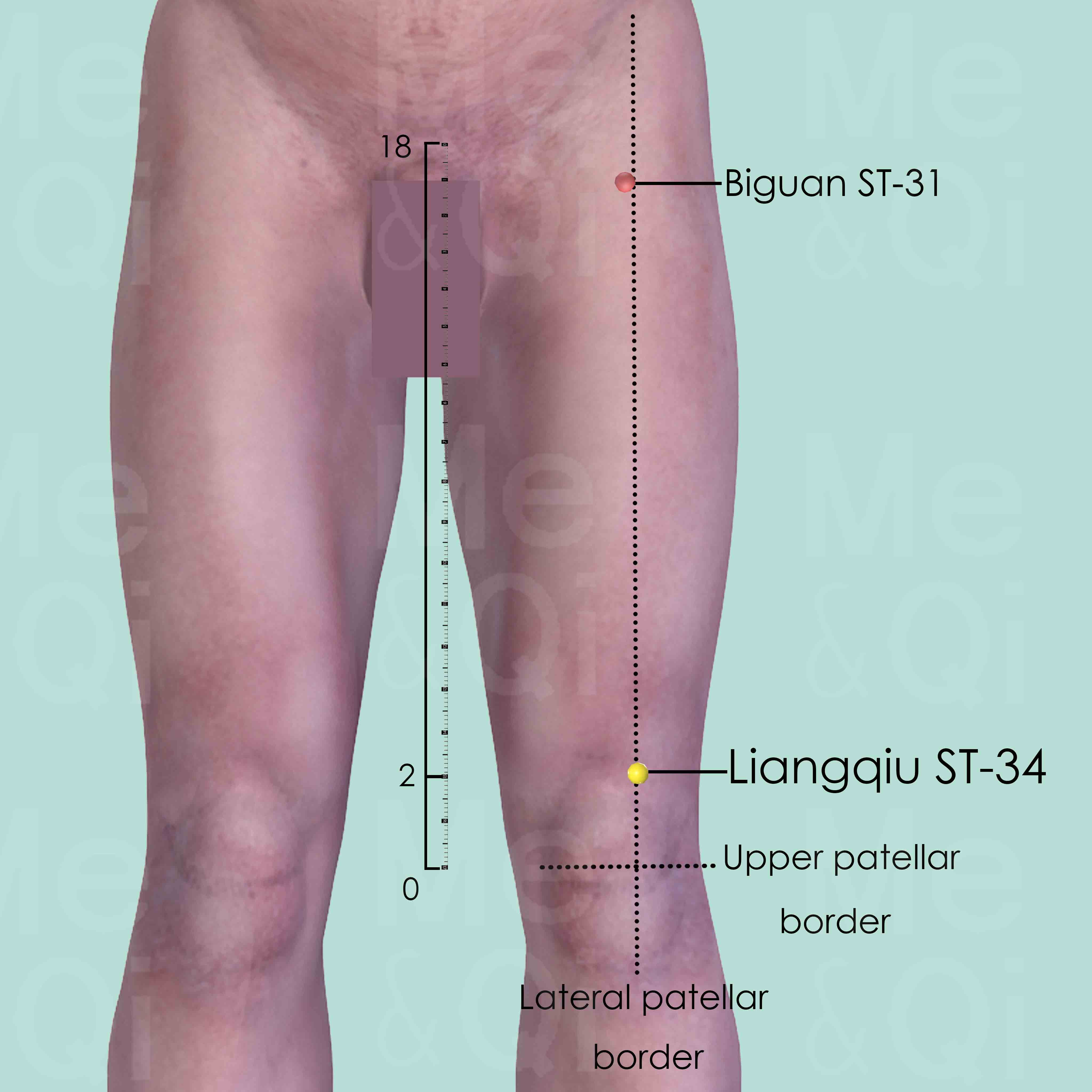
Liangqiu ST-34
2 cun above the upper-lateral border of the patella, on a line between the upper lateral patellar border and the anterior superior iliac spine (ASIS).
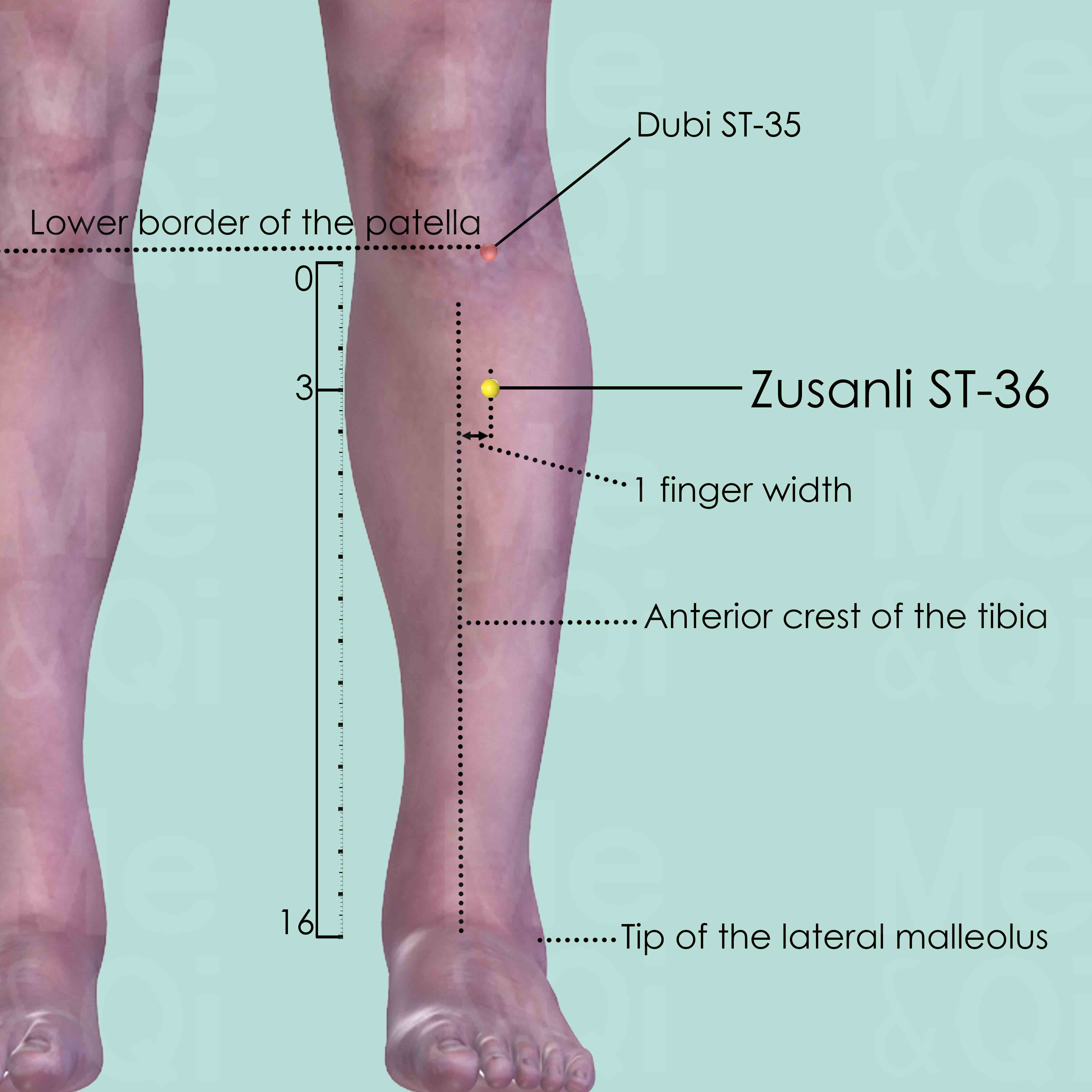
Zusanli ST-36
3 cun below Dubi ST-35, one finger breadth lateral to the anterior crest of the tibia, on the tibialis anterior muscle.
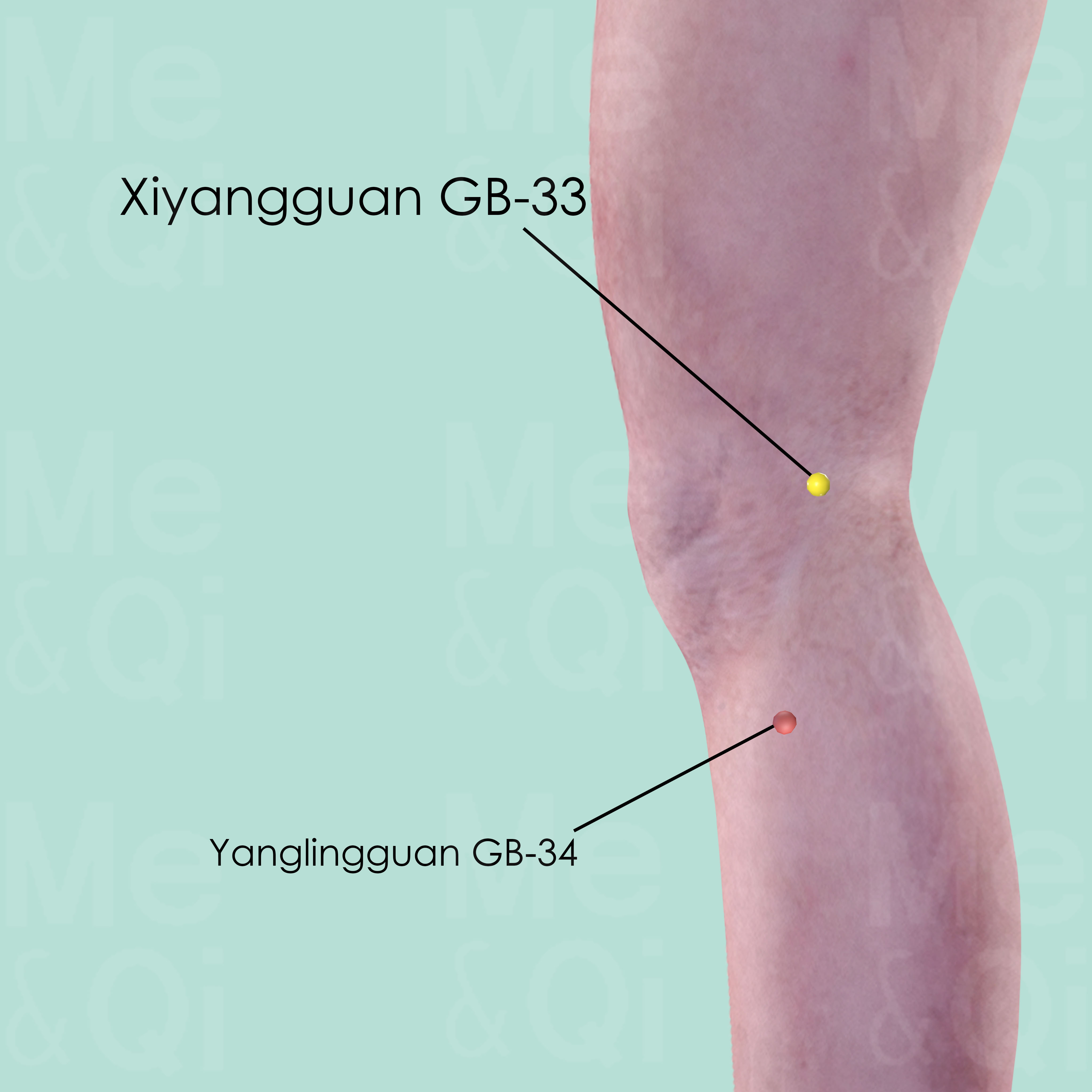
Xiyangguan GB-33
When the knee is flexed, Xiyangguan GB-33 is above Yanglingguan GB-34, in the depression between the shaft of the lateral epicondyle and the tendon of the biceps femoris muscle.
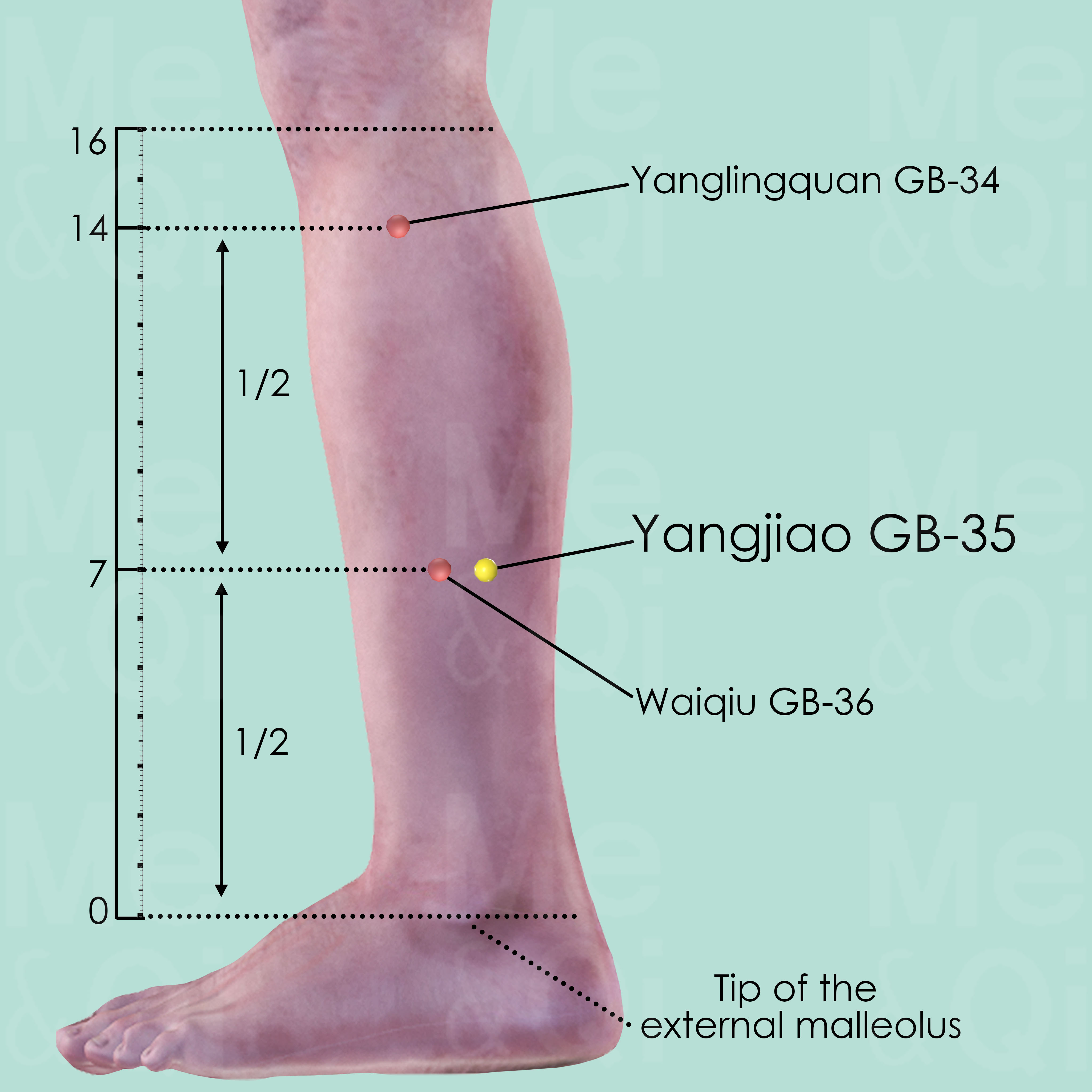
Yangjiao GB-35
7 cun above the tip of the external malleolus, on the posterior border of the fibula, within the distance between the tip of the external malleolus and Yanglingquan GB-34. It is also at the same level as Waiqiu GB-36.
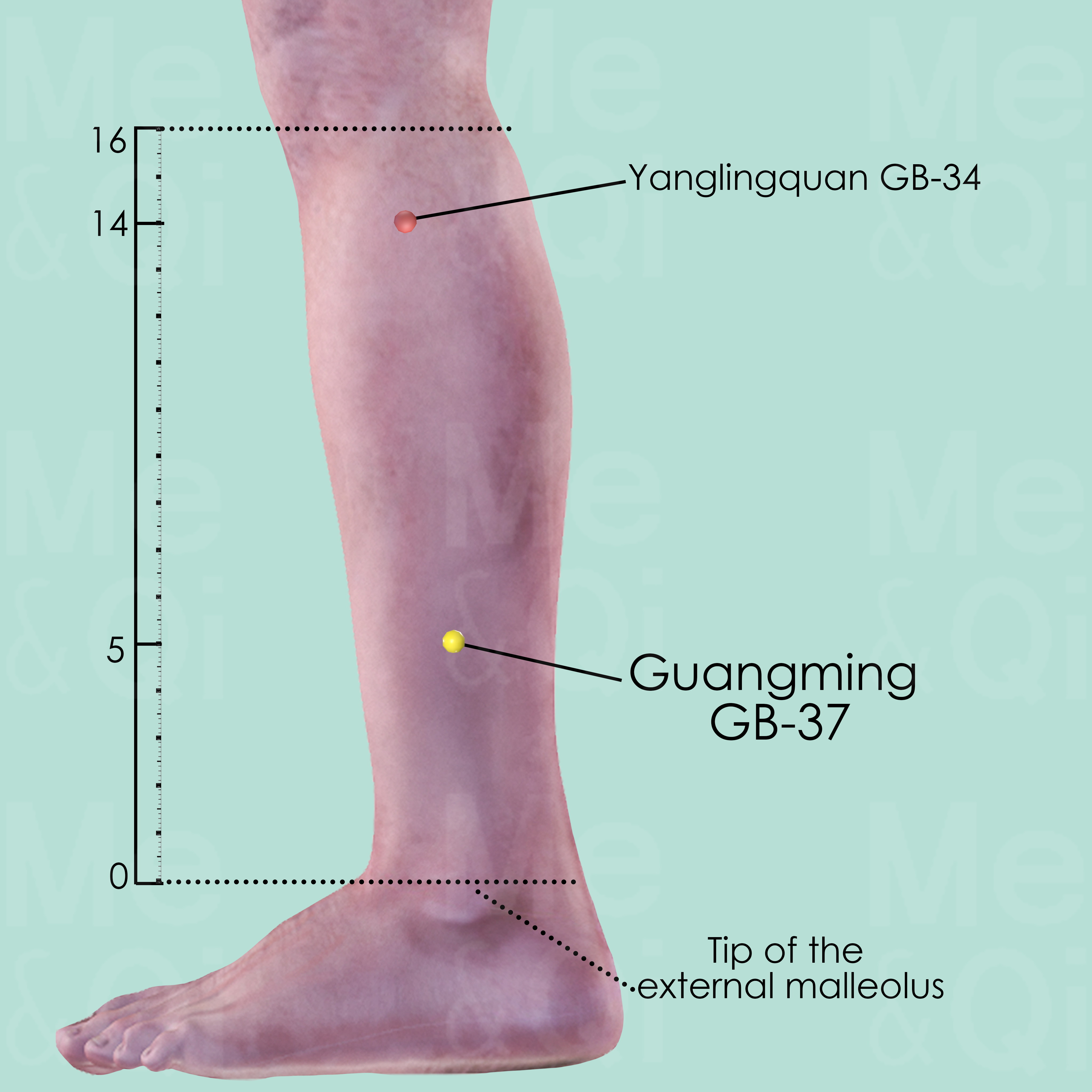
Guangming GB-37
5 cun directly above the tip of the external malleolus, on the anterior border of the fibula.
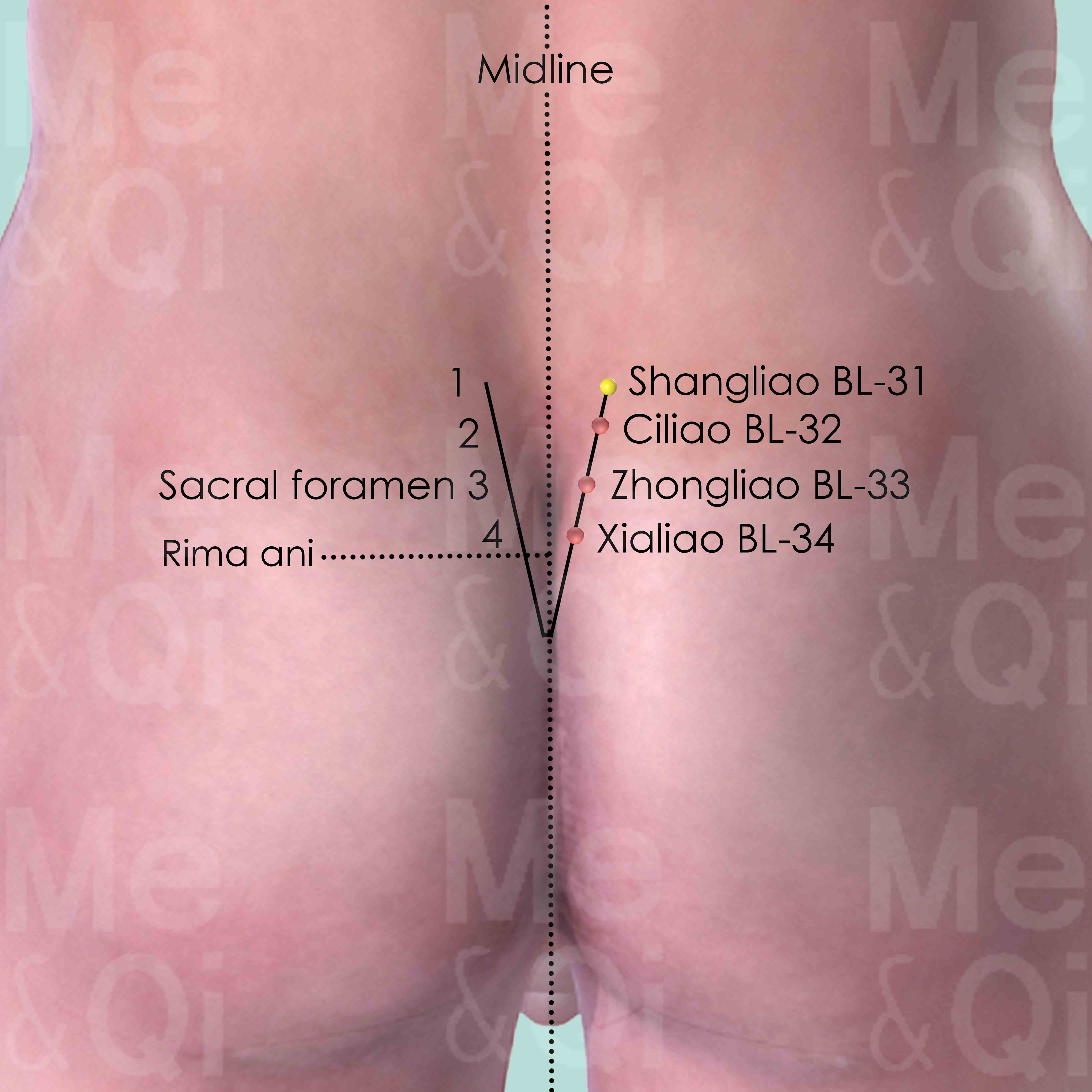
Shangliao BL-31
In the 1st posterior sacral foramen, about midway between the posterior superior iliac spine (PSIS) and the midline.
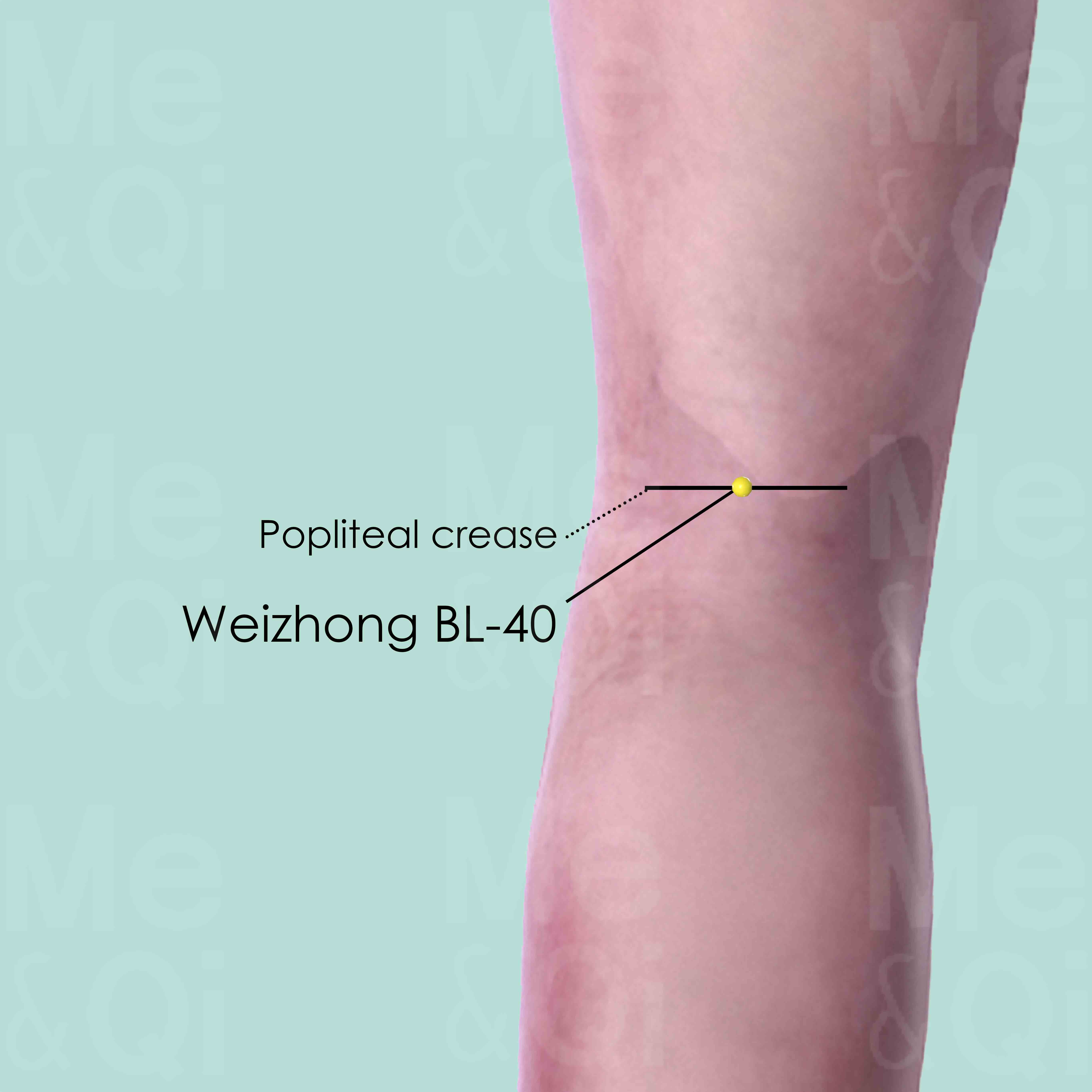
Weizhong BL-40
At the midpoint of the popliteal crease, between the tendons of biceps femoris and semitendinosus muscle.
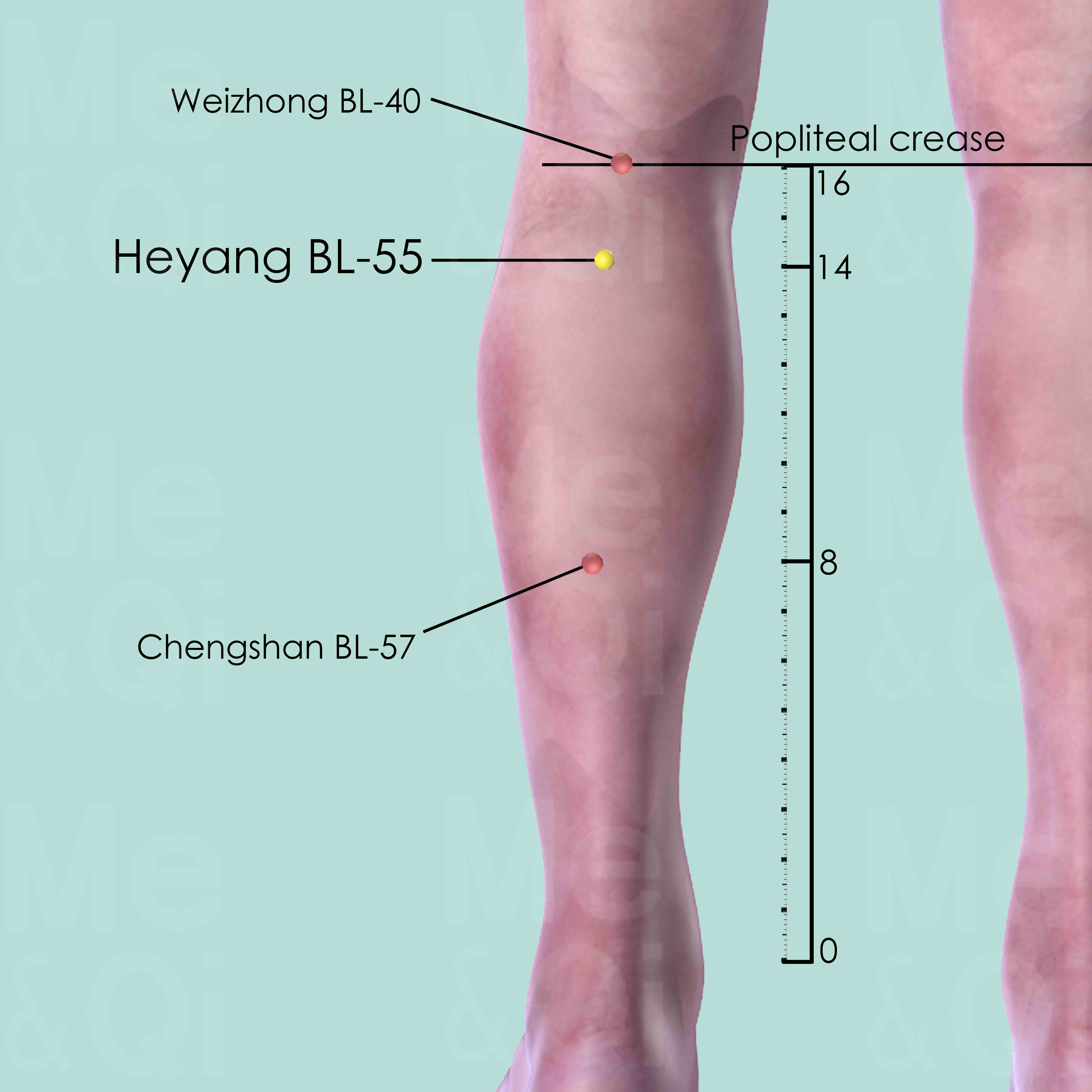
Heyang BL-55
2 cun directly below Weizhong BL-40, between the medial and lateral bellies of gastrocnemius muscle, on the line joining Weizhong BL-40 and Chengshan BL-57.
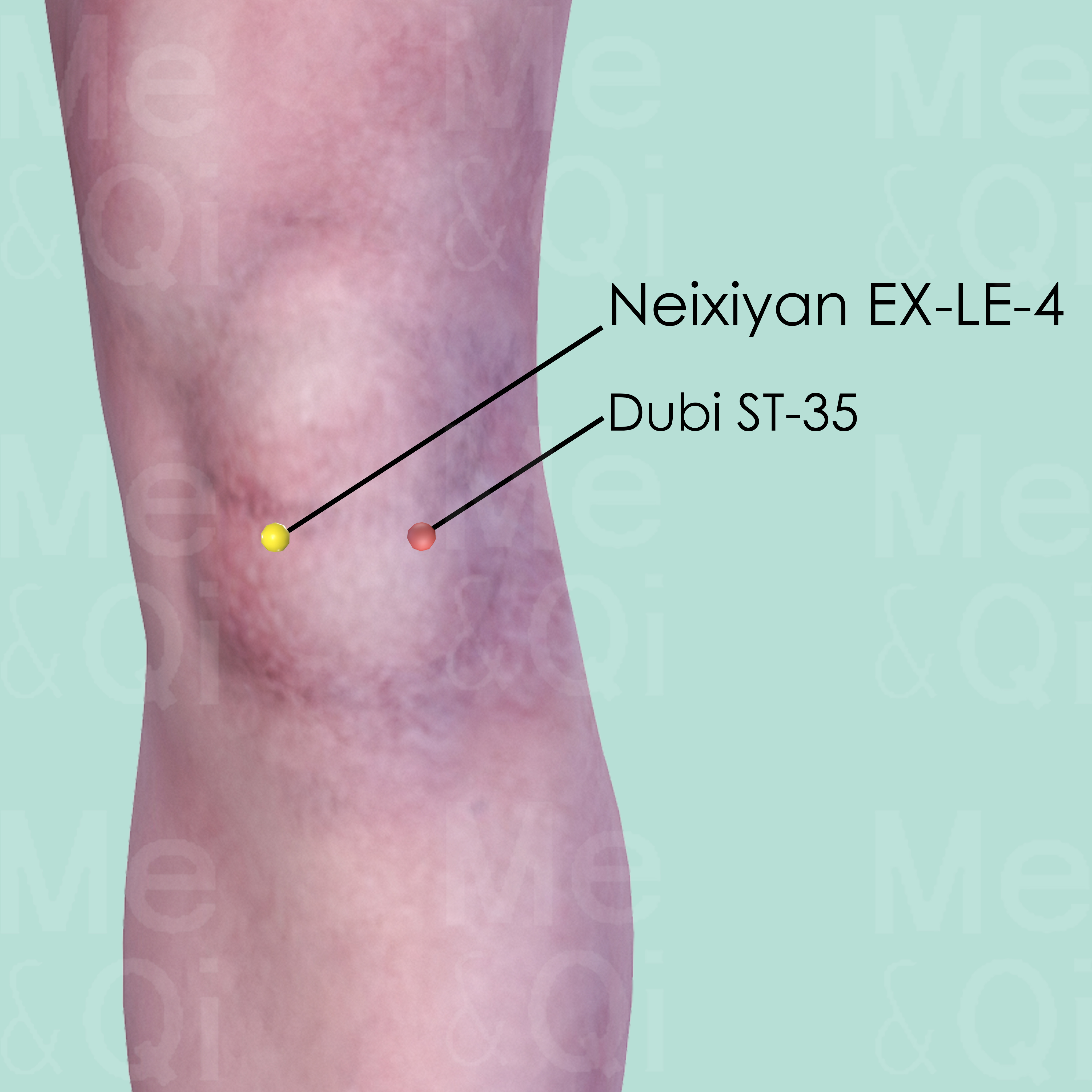
Neixiyan EX-LE-4
With the knee flexed, inferior to the patella, in a depression medial to the patellar ligament. Dubi ST-35 is at the same level, in a depression lateral to the patellar ligament. Both points form the Extra point of Xiyan EX-LE-5.
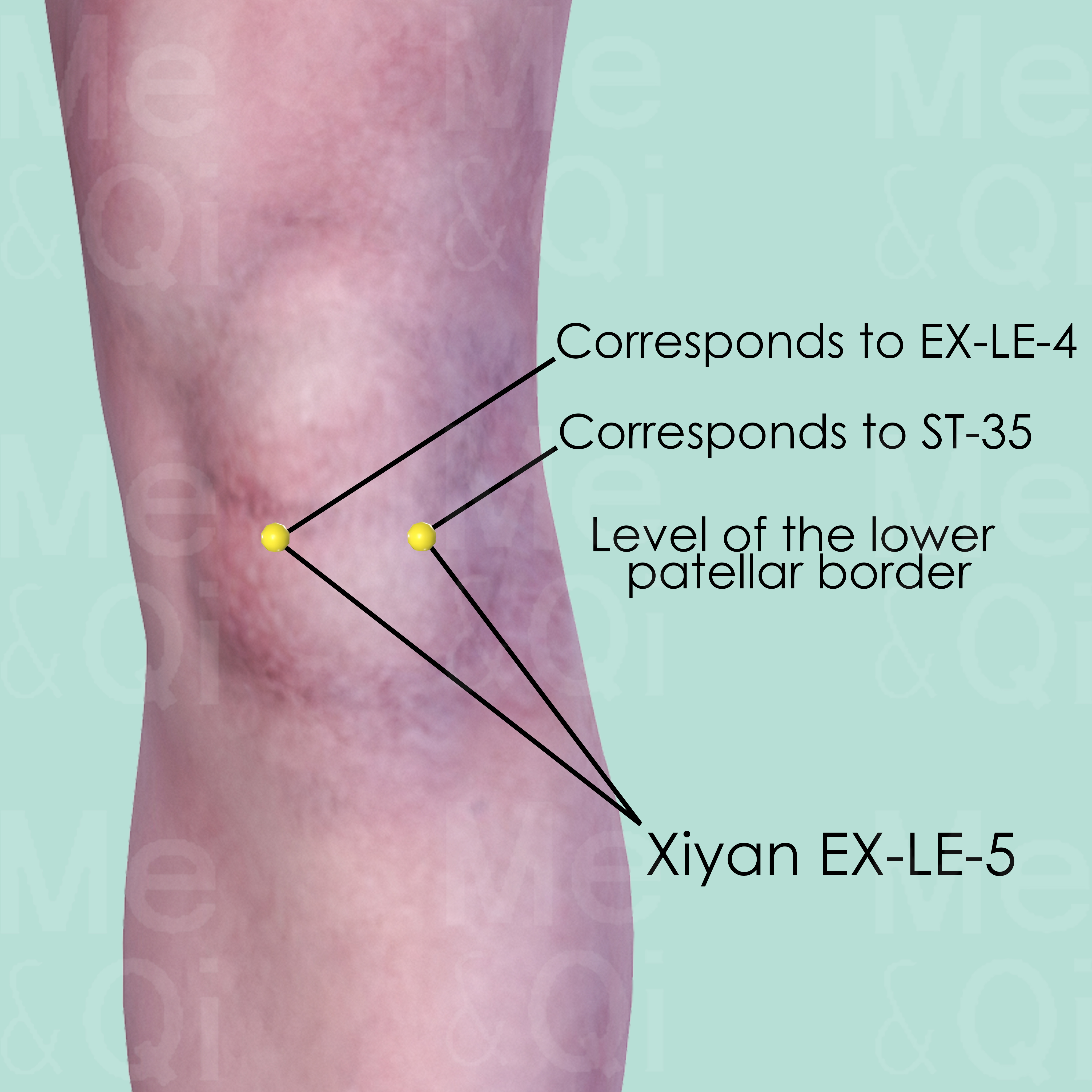
Xiyan EX-LE-5
This is a group of 2 points, composed of Dubi ST-35 and Neixiyan EX-LE-4. Both are located inferior to the patella, medial and lateral to the patellar ligament. Dubi ST-35 is the lateral one, while Neixiyan EX-LE-4 is the medial one.
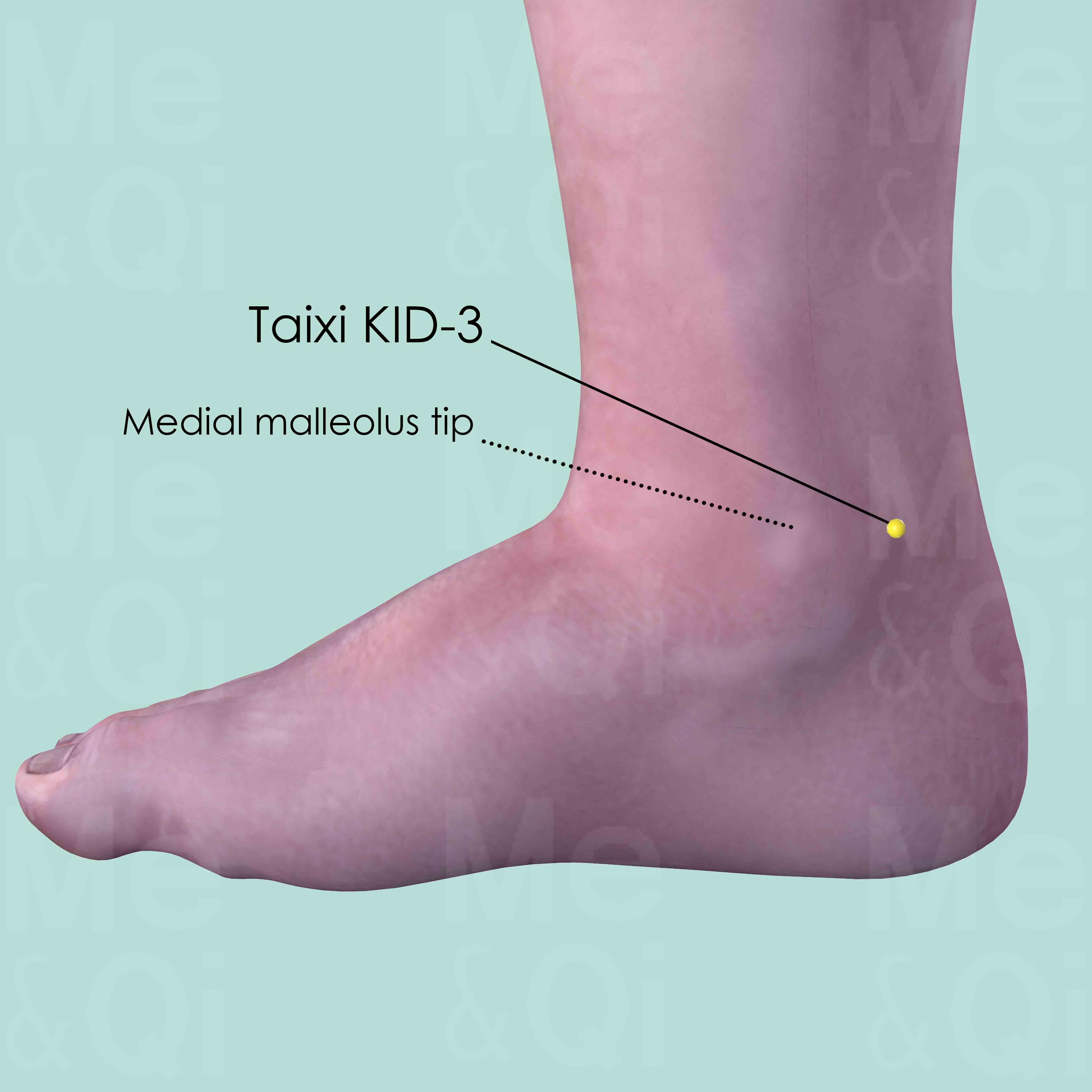
Taixi KID-3
In the depression between the medial malleolus tip and Achilles tendon (Calcaneal tendon), level with the tip of the medial malleolus.
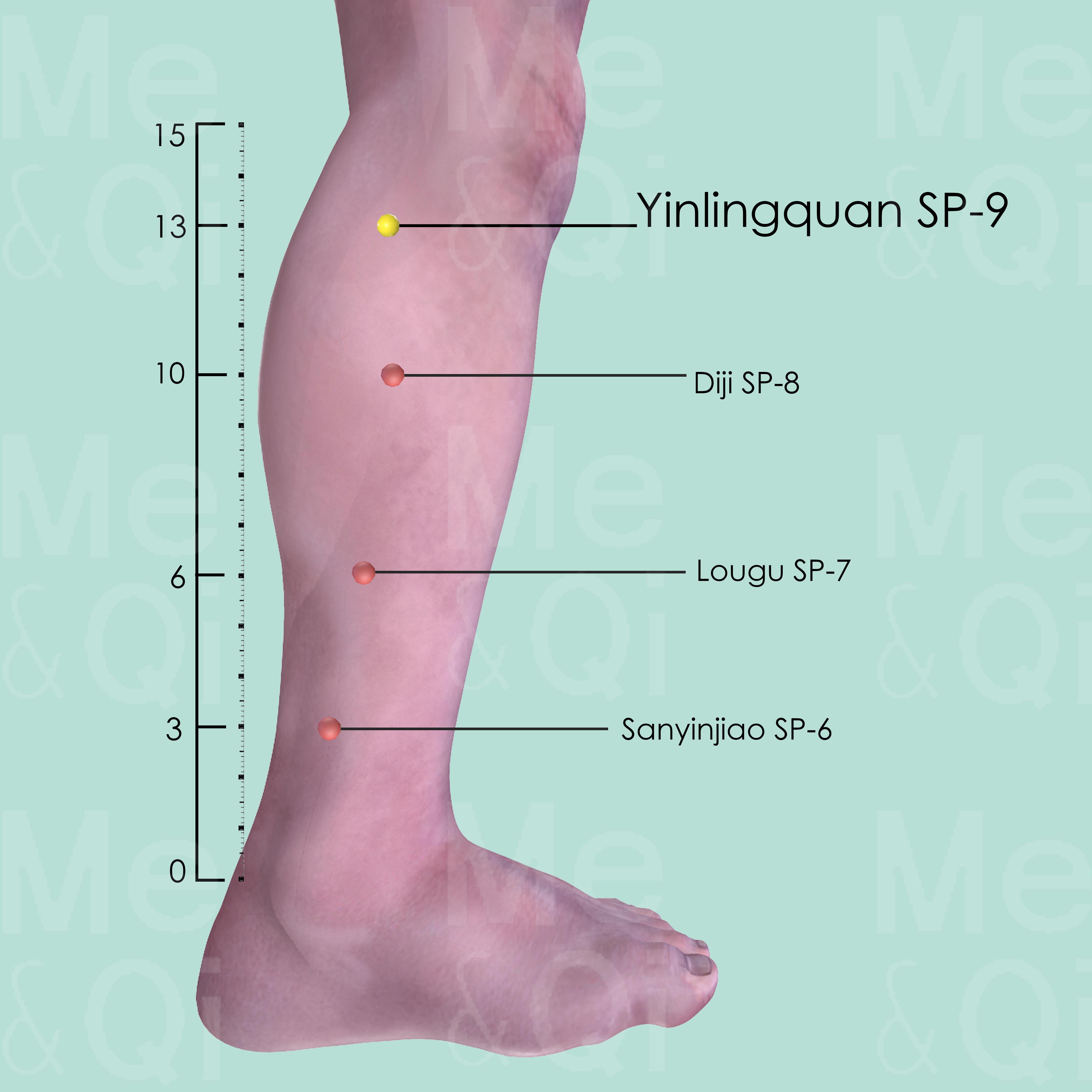
Yinlingquan SP-9
On the lower border of the medial condyle of the tibia, in the depression between the posterior border of the tibia and gastrocnemius muscle.
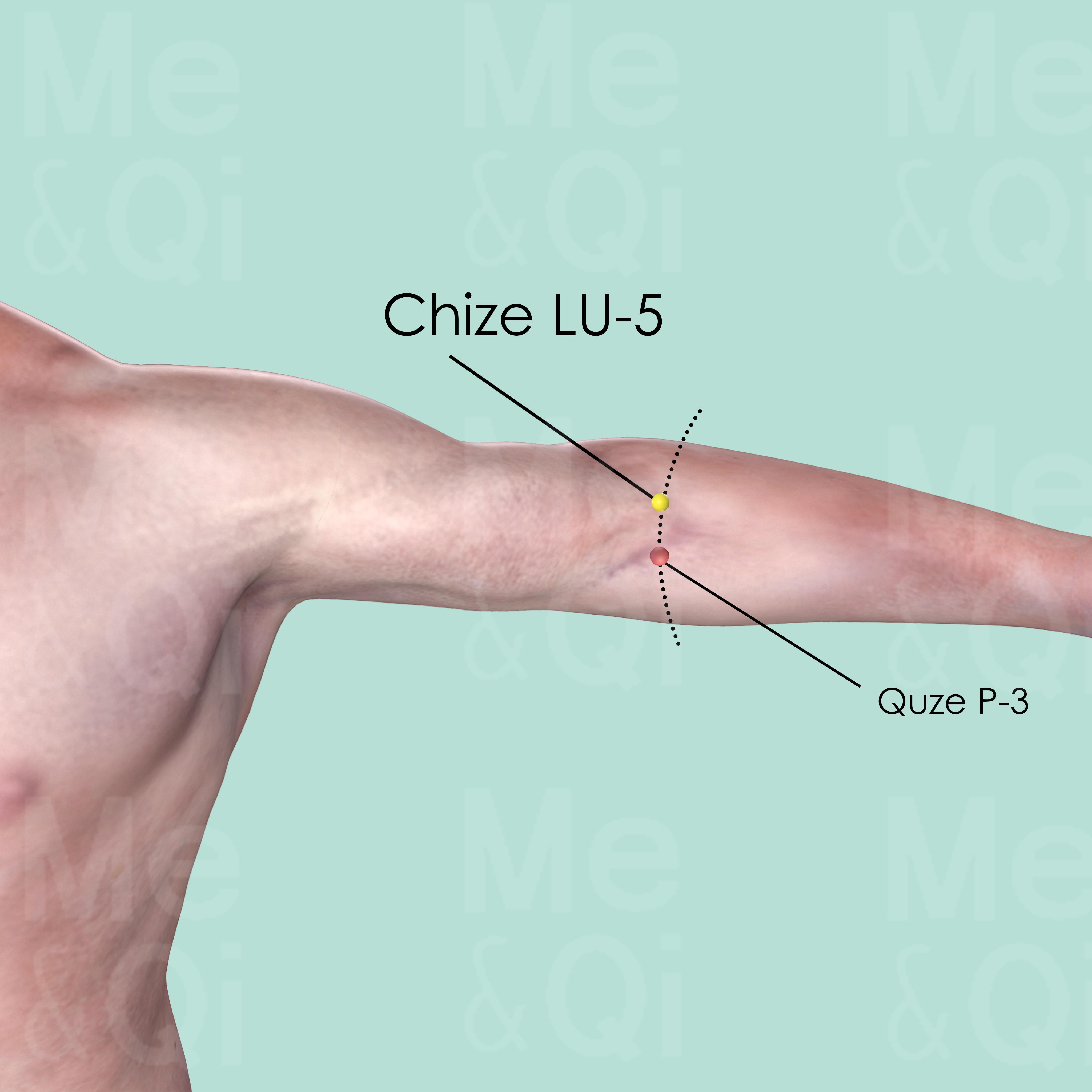
Chize LU-5
On the cubital crease, on the redial aspect of the biceps tendon. It can be easily identified when the elbow is slightly flexed.
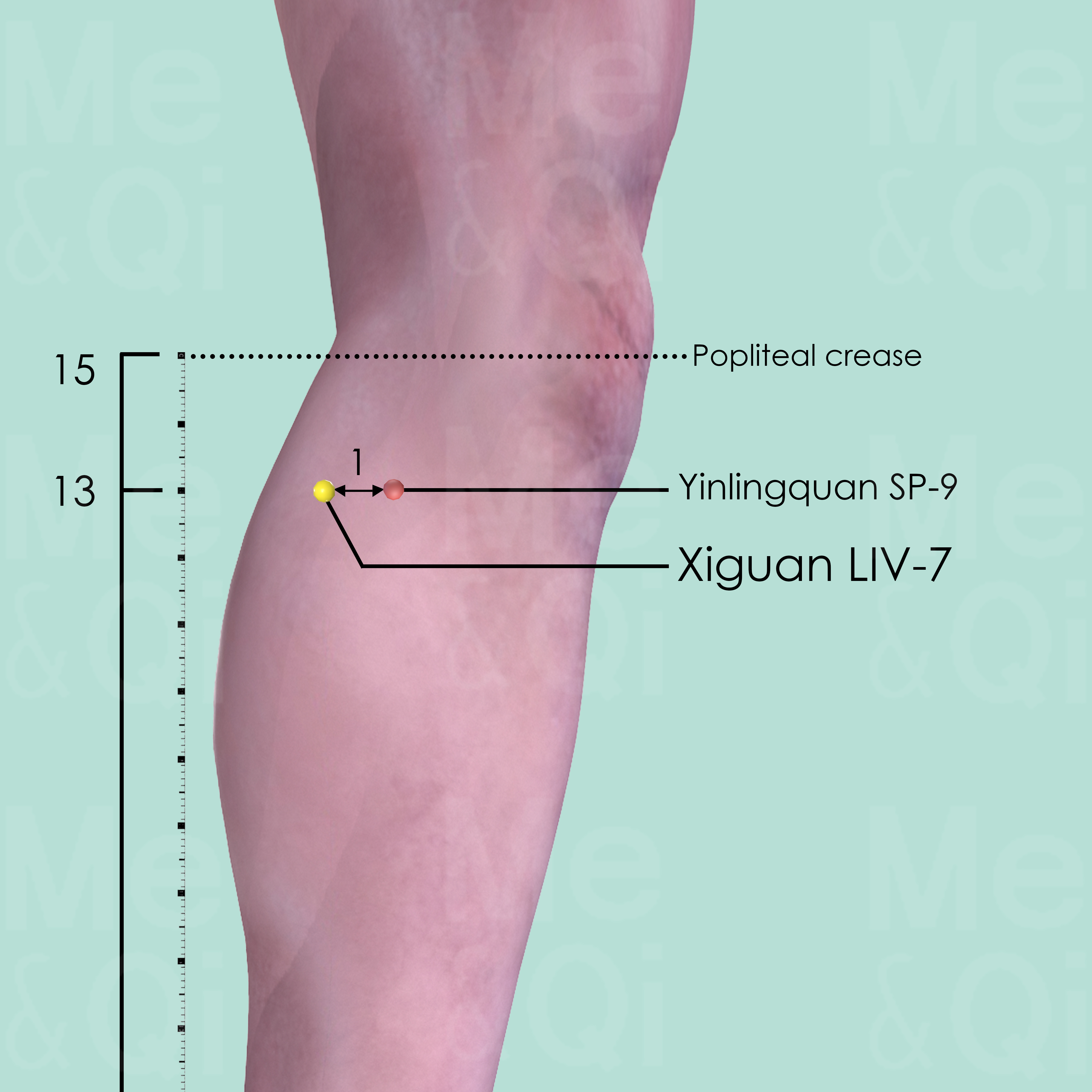
Xiguan LIV-7
Posterior and inferior to the medial condyle of the tibia, in the upper portion of the medial head of the gastrocnemius muscle, 1 cun posterior to Yinlingquan SP-9.

